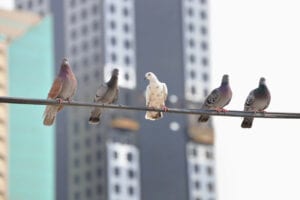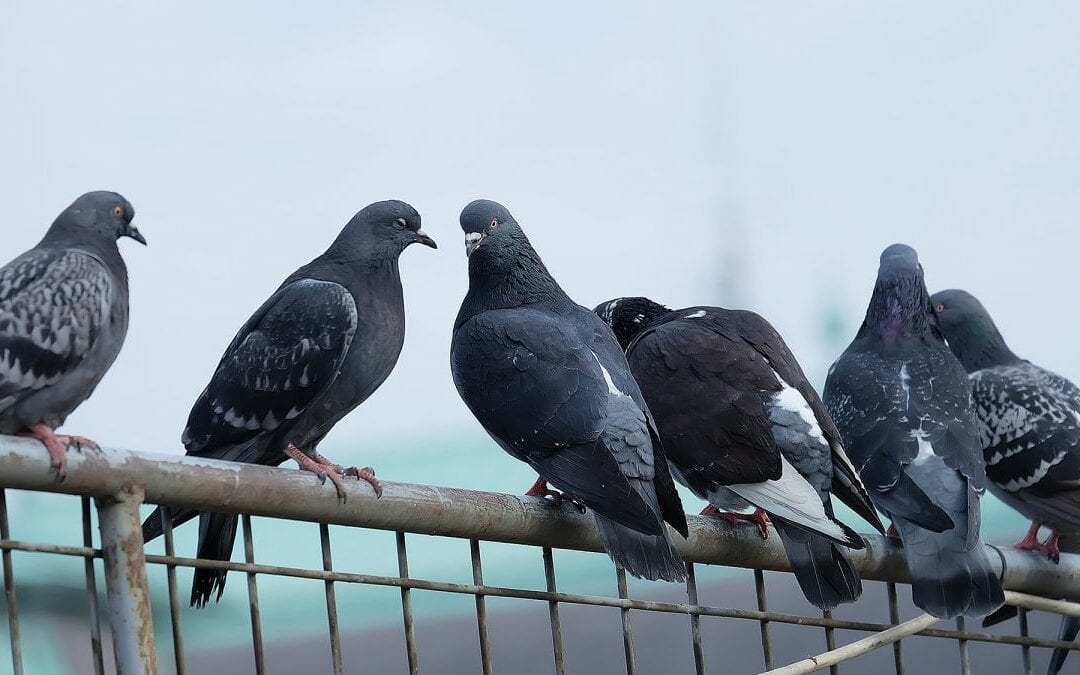
by Pigeon Patrol | Jul 19, 2021 | Bird Netting, Bird Spikes, Columbidae, Doves, pet bird, Pigeon Control
Homing pigeons are called messenger pigeons when they are used to carry messages. Messages have to be written on light, thin paper (such as cigarette paper) and rolled into a small tube that is attached to the bird’s leg. This is called “pigeon post.”
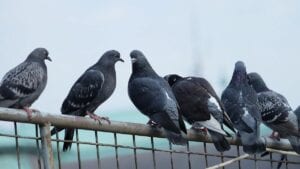
They have also been used to carry small light-weight packages, in including smuggling drugs into prisons.
RACING
In recent history, they are mainly used for the sport of pigeon racing. They have been bred for racing and can reach speeds between 60 – 80 miles per hour. They can fly up to 80 to 600 miles in one single day.
In 2010, Jose Ledesma’s pigeons finish a personal racing season in Canary Islands with amazing resultss. Two young birds raced 3 times each from African coast in Morocco. Long Distance Races + 1st Regional Price against 1312 pigeons (National race equivalent in Belgium). Jose made an amazing movie of these pigeons flying over mountains, seas and deserts: http://www.youtube.com/watch?v=IAGKflxwxwI … Further information can be found on his website: http://www.joseledesma.com/ – J. Ledesma, Tenerife – Canary Islands
THE CARRIER OF MESSAGES
During the Franco-Prussian War of 1870–1871, the Prussians had surrounded the city of Paris preventing mail from entering or leaving the city. During the course of the siege, pigeons and mail were regularly taken out of Paris by hot-air balloons. The letters that were sent to Paris were first reduced in size by photography, so that 30,000 letters could be carried on film placed inside a canister. These canisters were attached to pigeons and these birds then flew into Paris. Thirty-five birds carried the same letters, so that if any were shot down, at least one would reach Paris. In Paris, the film was projected on a screen, and the letters were copied by hand and delivered to homes in the city.
These birds have been used to transport short messages across long distances. In fact, historically well-known leaders, such as Julius Caesar and Genghis Khan, have used them to carry important messages across long distances.
One of the world’s best known news agencies, Reuters, started its European business by using 45 trained birds to carry financial news on the continent in 1850. They carried the latest news and stock prices from Aachen in Germany to Brussels in Belgium, travelling the 76 miles in a record-breaking two hours – beating the railway by four hours.
The Chinese used them to deliver mail as long ago as 1000 B.C.
Source
Pigeon Patrol Products & Services is the leading manufacturer and distributor of bird deterrent (control) products in Canada. Pigeon Patrol products have solved pest bird problems in industrial, commercial, and residential settings since 2000, by using safe and humane bird deterrents with only bird and animal friendly solutions. At Pigeon Patrol, we manufacture and offer a variety of bird deterrents, ranging from Ultra-flex Bird Spikes with UV protection, Bird Netting, 4-S Bird Gel and the best Ultrasonic and audible sound devices on the market today.
Voted Best Canadian wholesaler for Bird Deterrent products ten years in a row.
Contact us at 1- 877– 4– NO-BIRD, (604) 585-9279 or visit our website at www.pigeonpatrol.ca
Pigeon/Pigeon Patrol / Pigeons Roosting / Vancouver Pigeon Control /Bird Spikes / Bird Control / Bird Deterrent / Pigeon Deterrent? Surrey Pigeon Control / Pest /Seagull deterrent / Vancouver Pigeon Blog / Birds Inside Home / Pigeons in the cities / Ice Pigeons/ What to do about pigeons/ sparrows , Damage by Sparrows, How To Keep Raccoons Away, Why Are Raccoons Considered Pests/ De-fence / Pigeon Nesting/ Bird Droppings / Pigeon Dropping/ woodpecker control/ Professional Bird Control Company/ Keep The Birds Away/ Birds/rats/ seagull/pigeon/woodpecker/ dove/sparrow/pidgeon control/pidgeon problem/ pidgeon control/flying rats/ pigeon Problems/ bird netting/bird gel/bird spray/bird nails/ bird guard
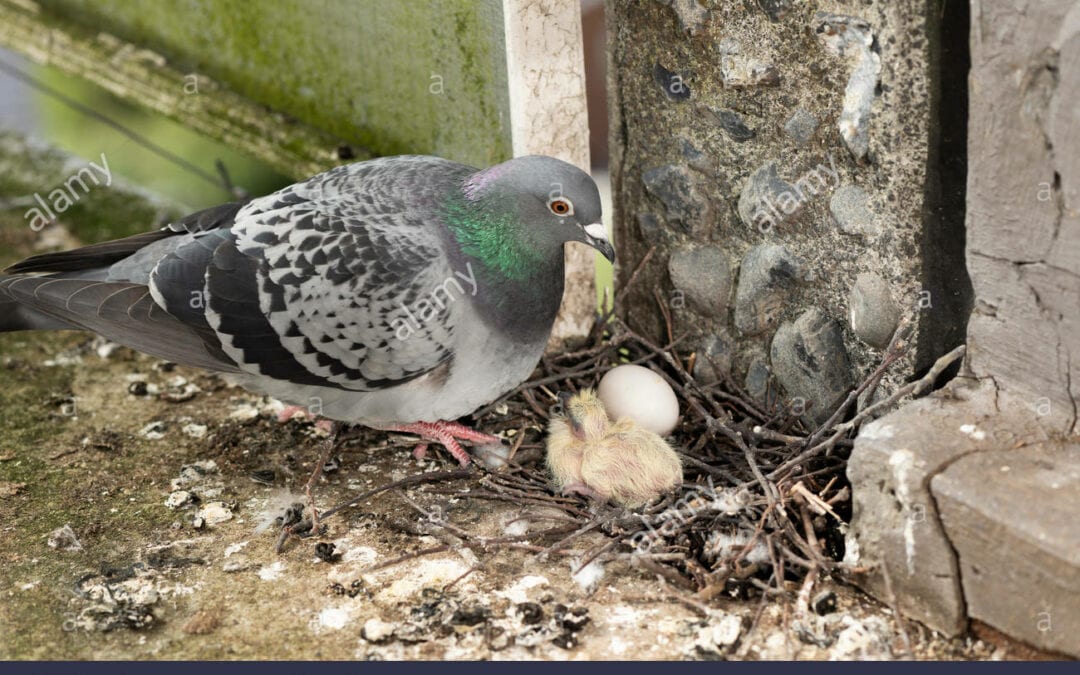
by Pigeon Patrol | Jul 19, 2021 | Pigeon Predators, Pigeon Spikes, Pigeons, Pigeons in the News, Raccoons, Sparrows, UltraSonic Bird Control
With bits of DNA extracted from century-old museum specimens, researchers have found a place for the extinct Passenger Pigeon (Ectopistes migratorius) in the family tree of pigeons and doves, identifying this unique bird’s closest living avian relatives for the first time. The new analysis, which appears this month in Molecular Phylogenetics and Evolution, reveals that the Passenger Pigeon was most closely related to other North and South American pigeons, and not to the Mourning Dove, as was previously suspected.
“This research demonstrates the remarkable potential of DNA to answer questions about species that no longer populate our planet,” says Dr. Jack Dumbacher, Curator of Ornithology at the California Academy of Sciences. “The Passenger Pigeon has been extinct for almost 100 years, but with the help of museum specimens and DNA analysis, we’re still learning new information about the bird’s evolutionary history and its place on the tree of life.”
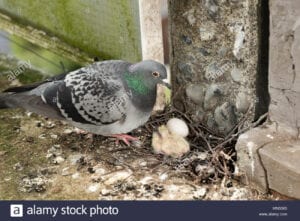
Naturalists have long lamented that one of North America’s most spectacular birds was also one of the first to be driven to extinction by humans. In the early 1800s, the Passenger Pigeon was the most abundant bird species on the planet, even though its range was limited to the eastern and central forests of the United States and parts of eastern Canada. Flocks of Passenger Pigeons included millions of birds–they were so vast that they darkened swaths of the sky up to a mile wide.
Passenger Pigeons followed their food, settling down in forests that periodically produced a superabundance of acorns and chestnuts. The pigeons nested in dense colonies covering hundreds of acres. This made them easy targets for human predators. Intensive pigeon hunting in the mid-to-late 19th century disrupted the birds’ ability to breed. These hunting sprees, coupled with habitat destruction, rapidly drove the Passenger Pigeon to extinction. (The last of her kind, a Passenger Pigeon named Martha, died in the Cincinnati Zoo in 1914.)
To find the Passenger Pigeon’s place in the evolutionary history of pigeons and doves, Dumbacher and his colleagues compared sequences from two of its mitochondrial genes with those of 78 species of pigeons and doves from around the world. Their analysis revealed a surprising result. Most scientists had assumed that the Passenger Pigeon’s closest relative was the Mourning Dove, a smaller species that shared the Passenger Pigeon’s relatively long tail. However, the DNA comparison showed that the extinct bird’s closest living relative is the Band-Tailed Pigeon (Patagioenas fasciata), a bird that is commonly found in California.
North America’s largest pigeon, the Band-Tailed Pigeon is distinguished not only by its large size but by its distinctive coloring, with yellow legs, a patch of iridescent greenish-bronze feathers on its neck, and a yellow bill with a black tip. Despite its large size, the bird is surprisingly adept at feeding on berries and seeds in the tops of trees. In northern California, it is found in mixed evergreen forests and redwood forests.
The research team was lead by Kevin Johnson, an ornithologist with the Illinois Natural History Survey at the University of Illinois. Additional team members included Jack Dumbacher from the California Academy of Sciences, Dale Clayton from the University of Utah, and Robert Fleischer from the Smithsonian Conservation Biology Institute. The research was funded by the National Science Foundation.
Source
Pigeon Patrol Products & Services is the leading manufacturer and distributor of bird deterrent (control) products in Canada. Pigeon Patrol products have solved pest bird problems in industrial, commercial, and residential settings since 2000, by using safe and humane bird deterrents with only bird and animal friendly solutions. At Pigeon Patrol, we manufacture and offer a variety of bird deterrents, ranging from Ultra-flex Bird Spikes with UV protection, Bird Netting, 4-S Bird Gel and the best Ultrasonic and audible sound devices on the market today.
Voted Best Canadian wholesaler for Bird Deterrent products ten years in a row.
Contact us at 1- 877– 4– NO-BIRD, (604) 585-9279 or visit our website at www.pigeonpatrol.ca
Pigeon/Pigeon Patrol / Pigeons Roosting / Vancouver Pigeon Control /Bird Spikes / Bird Control / Bird Deterrent / Pigeon Deterrent? Surrey Pigeon Control / Pest /Seagull deterrent / Vancouver Pigeon Blog / Birds Inside Home / Pigeons in the cities / Ice Pigeons/ What to do about pigeons/ sparrows , Damage by Sparrows, How To Keep Raccoons Away, Why Are Raccoons Considered Pests/ De-fence / Pigeon Nesting/ Bird Droppings / Pigeon Dropping/ woodpecker control/ Professional Bird Control Company/ Keep The Birds Away/ Birds/rats/ seagull/pigeon/woodpecker/ dove/sparrow/pidgeon control/pidgeon problem/ pidgeon control/flying rats/ pigeon Problems/ bird netting/bird gel/bird spray/bird nails/ bird guard

by Pigeon Patrol | Jul 19, 2021 | Bird Deterrent Products, Doves, history of pigeons, MBCA, pet bird, Pigeon Control
I have written before about the widespread fear of German paratroops in Britain in May and June 1940. Here’s a sterling example from somewhere in London, as described in the Ministry of Information’s Home Intelligence report for 7 June 1940:
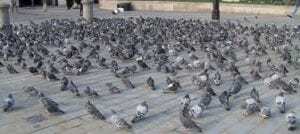
A false alarm on a housing estate of parachutists occasioned by a flock of pigeons resulted in about half the tenants rushing to the roof and the rest rushing to the shelters in the basement. In the melee several women fainted. These people are normally calm and collected. They seem to need more advice as to what to do and how to do it on such occasions.
It’s hard to imagine how an ordinary flock of pigeons could be mistaken for descending parachutists. But if there’s one thing I’ve been hammering over and over on this blog, it’s this: fear can make people see danger in the innocuous, whether it’s footpaths, meteors, motor cars, Venus, Venus, weather balloons, or even nothing at all. Having said that, there’s less evidence of widespread misperception of this sort (as opposed to rumours, of which there are many, though with frustratingly few details) in the MOI reports than I might have expected.
Source
Pigeon Patrol Products & Services is the leading manufacturer and distributor of bird deterrent (control) products in Canada. Pigeon Patrol products have solved pest bird problems in industrial, commercial, and residential settings since 2000, by using safe and humane bird deterrents with only bird and animal friendly solutions. At Pigeon Patrol, we manufacture and offer a variety of bird deterrents, ranging from Ultra-flex Bird Spikes with UV protection, Bird Netting, 4-S Bird Gel and the best Ultrasonic and audible sound devices on the market today.
Voted Best Canadian wholesaler for Bird Deterrent products ten years in a row.
Contact us at 1- 877– 4– NO-BIRD, (604) 585-9279 or visit our website at www.pigeonpatrol.ca
Pigeon/Pigeon Patrol / Pigeons Roosting / Vancouver Pigeon Control /Bird Spikes / Bird Control / Bird Deterrent / Pigeon Deterrent? Surrey Pigeon Control / Pest /Seagull deterrent / Vancouver Pigeon Blog / Birds Inside Home / Pigeons in the cities / Ice Pigeons/ What to do about pigeons/ sparrows , Damage by Sparrows, How To Keep Raccoons Away, Why Are Raccoons Considered Pests/ De-fence / Pigeon Nesting/ Bird Droppings / Pigeon Dropping/ woodpecker control/ Professional Bird Control Company/ Keep The Birds Away/ Birds/rats/ seagull/pigeon/woodpecker/ dove/sparrow/pidgeon control/pidgeon problem/ pidgeon control/flying rats/ pigeon Problems/ bird netting/bird gel/bird spray/bird nails/ bird guard
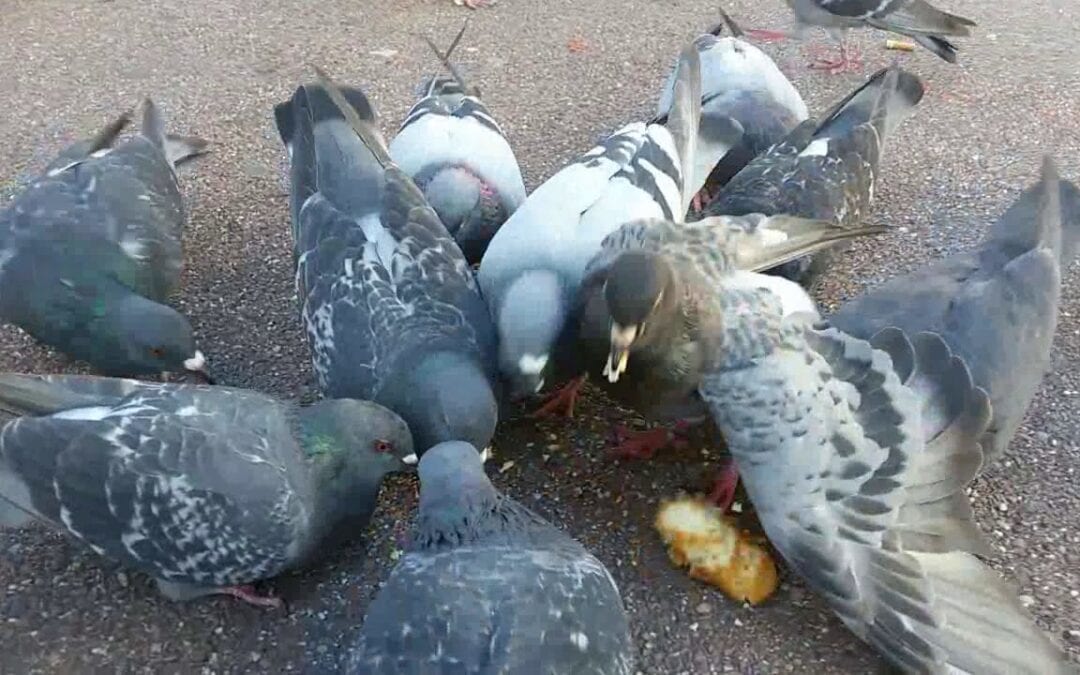
by Pigeon Patrol | Jul 19, 2021 | Pigeon Predators, Pigeon Spikes, Pigeons, Pigeons in the News, Raccoons
Six pigeons were trained in a change detection task with four colors. They were shown two colored circles on a sample array, followed by a test array with the color of one circle changed. The pigeons learned to choose the changed color and transferred their performance to four unfamiliar colors, suggesting that they had learned a generalized concept of color change. They also transferred performance to test delays several times their 50-msec training delay without prior delay training. The accurate delay performance of several seconds suggests that their change detection was memory based, as opposed to a perceptual attentional capture process. These experiments are the first to show that an animal species (pigeons, in this case) can learn a change detection task identical to ones used to test human memory, thereby providing the possibility of directly comparing short-term memory processing across species.

Source
Pigeon Patrol Products & Services is the leading manufacturer and distributor of bird deterrent (control) products in Canada. Pigeon Patrol products have solved pest bird problems in industrial, commercial, and residential settings since 2000, by using safe and humane bird deterrents with only bird and animal friendly solutions. At Pigeon Patrol, we manufacture and offer a variety of bird deterrents, ranging from Ultra-flex Bird Spikes with UV protection, Bird Netting, 4-S Bird Gel and the best Ultrasonic and audible sound devices on the market today.
Voted Best Canadian wholesaler for Bird Deterrent products ten years in a row.
Contact us at 1- 877– 4– NO-BIRD, (604) 585-9279 or visit our website at www.pigeonpatrol.ca
Pigeon/Pigeon Patrol / Pigeons Roosting / Vancouver Pigeon Control /Bird Spikes / Bird Control / Bird Deterrent / Pigeon Deterrent? Surrey Pigeon Control / Pest /Seagull deterrent / Vancouver Pigeon Blog / Birds Inside Home / Pigeons in the cities / Ice Pigeons/ What to do about pigeons/ sparrows , Damage by Sparrows, How To Keep Raccoons Away, Why Are Raccoons Considered Pests/ De-fence / Pigeon Nesting/ Bird Droppings / Pigeon Dropping/ woodpecker control/ Professional Bird Control Company/ Keep The Birds Away/ Birds/rats/ seagull/pigeon/woodpecker/ dove/sparrow/pidgeon control/pidgeon problem/ pidgeon control/flying rats/ pigeon Problems/ bird netting/bird gel/bird spray/bird nails/ bird guard

by Pigeon Patrol | Jul 19, 2021 | Pigeon Patrol's Services, Pigeon Predators, Pigeon Spikes, Pigeons, Pigeons in the News
One of Northern Ireland’s smallest World War II heroes has been honoured.
Paddy, a messenger pigeon who served with the RAF during the Normandy operations in June 1944, was remembered in his home town of Larne on Friday.
PDSA, Britain’s biggest veterinary charity, awarded Paddy the Dickin Medal, dubbed the animals’ “Victoria Cross”, 65 years ago this month.
He received it for being the fastest pigeon to reach England with a coded message from the battle-front beaches of Normandy.
The brave bird brought back vital information about the Allies’ progress, flying 230 miles in four hours 50 minutes – the fastest time of any of the messenger pigeons involved in the mission with an average speed of 56mph.
PDSA spokesman James Puxty said: “Paddy’s contribution to the D-Day operations was a credit to the thousands of messenger pigeons donated by the racing pigeon fraternity for service during World War II.
“He was one of 32 brave, feathered heroes that received the PDSA Dickin Medal for their life-saving flights during the war, and the only recipient from Northern Ireland.”
Local hero
Paddy was born and raised in Carnlough and joined thousands of other racing birds who were trained and drafted to RAF Hurn in Hampshire for military service.
Impressing military brass with his flying in the Air-Sea rescue units he was seconded to the United States First Army for undercover missions during the Normandy Landings.
In the face of poor weather conditions and the threat of German falcons, deployed to intercept Paddy and his comrades, he delivered his message to his home loft at RAF Hurn.
After the war Paddy returned to Carnlough and lived out his days with his owner Captain Andrew Hughes, until his death in 1954.
A memorial to the winged hero was erected in Carnlough harbour.
A feathered fly-past of pigeons formed part of the Paddy Memorial Day event held at Larne Museum and Arts Centre.
Larne Borough Council and the town’s historical society were joined by guests from PDSA and the owner of Paddy’s PDSA Dickin Medal, former Irish Army officer Kevin Spring.
Younger guests were entertained by Gail Seekamp, the children’s author, who read from her book “Paddy the Pigeon”.
The Dickin Medal was introduced in 1943 by Maria Dickin, PDSA’s founder. She wanted to recognise the gallantry and devotion to duty of animals serving with the Armed Forces and Civil Defence units during WWII.
Source
Pigeon Patrol Products & Services is the leading manufacturer and distributor of bird deterrent (control) products in Canada. Pigeon Patrol products have solved pest bird problems in industrial, commercial, and residential settings since 2000, by using safe and humane bird deterrents with only bird and animal friendly solutions. At Pigeon Patrol, we manufacture and offer a variety of bird deterrents, ranging from Ultra-flex Bird Spikes with UV protection, Bird Netting, 4-S Bird Gel and the best Ultrasonic and audible sound devices on the market today.
Voted Best Canadian wholesaler for Bird Deterrent products ten years in a row.
Contact us at 1- 877– 4– NO-BIRD, (604) 585-9279 or visit our website at www.pigeonpatrol.ca
Pigeon/Pigeon Patrol / Pigeons Roosting / Vancouver Pigeon Control /Bird Spikes / Bird Control / Bird Deterrent / Pigeon Deterrent? Surrey Pigeon Control / Pest /Seagull deterrent / Vancouver Pigeon Blog / Birds Inside Home / Pigeons in the cities / Ice Pigeons/ What to do about pigeons/ sparrows , Damage by Sparrows, How To Keep Raccoons Away, Why Are Raccoons Considered Pests/ De-fence / Pigeon Nesting/ Bird Droppings / Pigeon Dropping/ woodpecker control/ Professional Bird Control Company/ Keep The Birds Away/ Birds/rats/ seagull/pigeon/woodpecker/ dove/sparrow/pidgeon control/pidgeon problem/ pidgeon control/flying rats/ pigeon Problems/ bird netting/bird gel/bird spray/bird nails/ bird guard
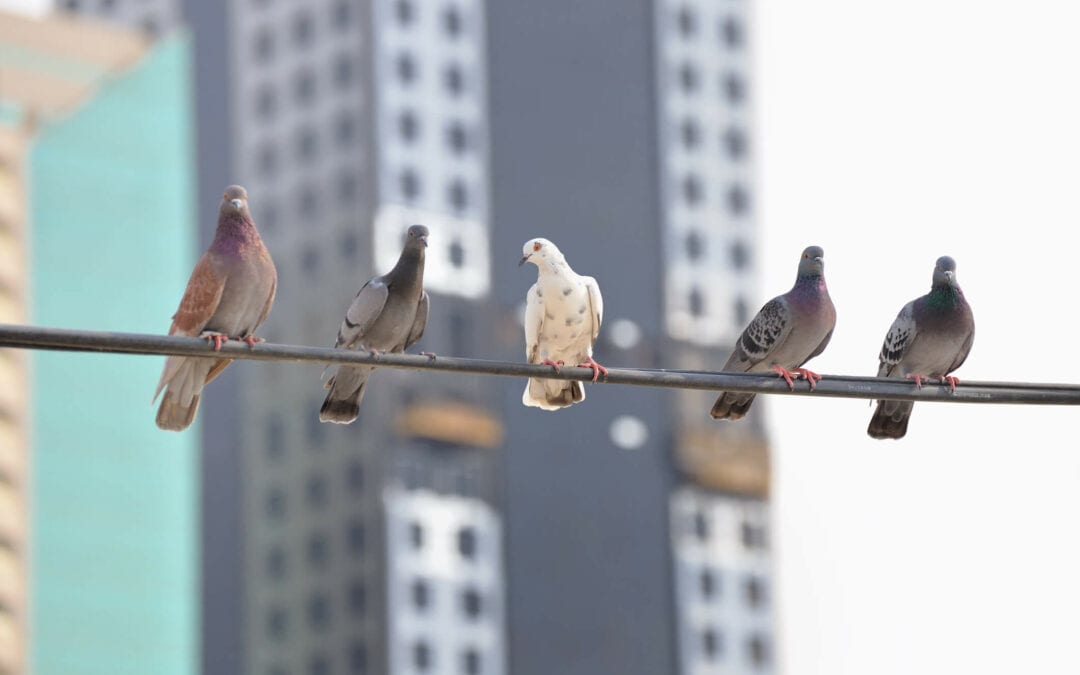
by Pigeon Patrol | Jul 19, 2021 | Animal Deterrent Products, Bird Deterrent Products, Bird Law, Bird Netting, Bird Spikes, Columbidae
Broadband is the most modern of communication means, while carrier pigeons date back to Roman times.
But on Thursday, a race between the two highlighted the low speeds of rural broadband in the UK; the pigeon won.
Ten USB key-laden pigeons were released from a Yorkshire farm at the same time a five-minute video upload was begun.
An hour and a quarter later, the pigeons had reached their destination in Skegness 120km away, while only 24% of a 300MB file had uploaded.
Campaigners say the stunt was being carried out to illustrate that broadband in some parts of the UK is still “not fit for purpose”.
It is not the first time that such a race has taken place. Last year a similar experiment in Durban, South Africa saw Winston the pigeon take two hours to finish a 96km journey. In the same time just 4% of a 4GB file had downloaded.
The pigeons are expected to complete a 120km journey to Skegness in around two hours, but Tref Davies, who is organising the stunt to give publicity to the campaign for better rural broadband, said the broadband connection will take significantly longer to transfer the 300MB file.
“The farm we are using has a connection of around 100 to 200 Kbps (kilobits per second),” Tref Davies, the stunt’s organiser, told BBC News on Thursday morning.
“The kids need to do school work and the farmer has to submit online forms but the connection is not fit for purpose.”
Mr Davies, who is co-founder of business ISP Timico and serves on the board of ISPA (Internet Service Providers’ Association), believes the issue is one that industry and government needs to address.
“This is the UK. It should be well-connected but around a third of homes still can’t get broadband,” he said.
However, BT disputes his figures. A spokesperson said that 99% of homes could now get broadband, leaving an estimated 160,000 lines “where excessive line length means broadband won’t work”.
Even among those who can get broadband, rural areas are fighting to get reasonable speeds.
Research commissioned by the BBC last year found that around three million homes in the UK had internet connections of below 2Mbps (megabits per second).
The government has committed to delivering a minimum of 2Mbps to every home by 2015.
However, a recent report by communications watchdog Ofcom found that while these “headline speeds” were on the rise, they are not the relevant measure for broadband customers.
According to the report, “although headline speeds increased by nearly 50% between April 2009 and May 2010, actual speeds delivered increased by just 27%, and averaged just 46% of headline speeds”.
Lloyd Felton, founder of the Rural Broadband Partnership, said the effort to draw attention to rural broadband deprivation and low speeds was laudable.
“It’s true that there are particular areas of the country that suffer much more than others,” Mr Felton told BBC News.
“You’ve got massive deprivation – this long-quoted ‘digital divide’. As we all get more dependent on the internet, that divide gets wider.
“In the end it’s who takes ownership and responsibility for co-ordinating how a parish is going to handle it – what we say is that ‘communities need to help themselves to broadband’.”
Source
Pigeon Patrol Products & Services is the leading manufacturer and distributor of bird deterrent (control) products in Canada. Pigeon Patrol products have solved pest bird problems in industrial, commercial, and residential settings since 2000, by using safe and humane bird deterrents with only bird and animal friendly solutions. At Pigeon Patrol, we manufacture and offer a variety of bird deterrents, ranging from Ultra-flex Bird Spikes with UV protection, Bird Netting, 4-S Bird Gel and the best Ultrasonic and audible sound devices on the market today.
Voted Best Canadian wholesaler for Bird Deterrent products ten years in a row.
Contact us at 1- 877– 4– NO-BIRD, (604) 585-9279 or visit our website at www.pigeonpatrol.ca
Pigeon/Pigeon Patrol / Pigeons Roosting / Vancouver Pigeon Control /Bird Spikes / Bird Control / Bird Deterrent / Pigeon Deterrent? Surrey Pigeon Control / Pest /Seagull deterrent / Vancouver Pigeon Blog / Birds Inside Home / Pigeons in the cities / Ice Pigeons/ What to do about pigeons/ sparrows , Damage by Sparrows, How To Keep Raccoons Away, Why Are Raccoons Considered Pests/ De-fence / Pigeon Nesting/ Bird Droppings / Pigeon Dropping/ woodpecker control/ Professional Bird Control Company/ Keep The Birds Away/ Birds/rats/ seagull/pigeon/woodpecker/ dove/sparrow/pidgeon control/pidgeon problem/ pidgeon control/flying rats/ pigeon Problems/ bird netting/bird gel/bird spray/bird nails/ bird guard

by Pigeon Patrol | Jul 12, 2021 | Pigeon Predators, Pigeon Spikes, Pigeons, Pigeons in the News, Raccoons, Sparrows
All animals go through the circle of life, they are born (or hatched in the case of pigeons) live and die. But where do pigeons go to die? This article goes into it.
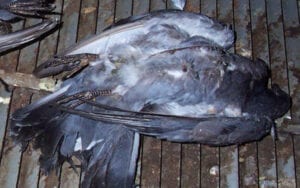
Pigeons look for dark secluded spaces to die. This includes holes, crevices, ventilation shafts and various building openings to spend their last moments. They do this to have peace away from predators in their last moments and they do this to not become a hindrance to the flock. They then die in peace in these spaces
At some point, everything comes to an end. It’s an inescapable fact of life. As humans, we have our final resting places, but what about birds? Considering how many pigeons are in existence one would assume that we would see more dead pigeons lying around, but we don’t. So, where do pigeons go to die?
Pigeons are one of the oldest domesticated and versatile birds of all times. They have been kept as pets, used as food, guides and otherwise. They are intelligent, they can recognize colours, measurements and have homing capabilities.
These animals are loyal, reliable and travel really fast, no wonder they’ve been messenger birds and travel guides. These birds are herbivores eating grains, vegetables, and fruits. They exist all around the world in large numbers and yet not many people have ever seen a dead pigeon.
Where do pigeons go to die?
These animals have a relatively short life span. They are also a tasty meal for any cats in the neighbourhood as well as predatory hawks. With so many pigeons dying often, how is that we never see dead pigeons everywhere? Do their feathered friends bury them or do they have someplace that they go before they reach bird haven?
Feral pigeons that live in cities look for dark covered spaces when they feel ill or are wounded. They’ve been this way for 1000s of years. They do this as a last-ditch attempt to recover in a safe space away from predators and not wanting to endanger the flock.
Pigeons will look for holes, crevices, ventilation shafts and various building openings to spend their last moments. Their small bodies decay very quickly after death. This explains why we don’t often see them dead and lying all over the place
Another reason why dead pigeon seems to disappear is to keep their dead bodies away from predators. These predators include cats, hawks, foxes, raccoons, and other opportunistic predators that will prey on weak and or dead and dying creatures. These predators are quick to attack so chances are before the sick pigeon can hit the ground they’ve been swooped up and snatched off as a meal.
How long do pigeons live?
How long pigeons live for is dependent on a couple of factors. While it is very unlikely for them to survive until old age in the wild, they may not do much better in captivity either. A pigeon in the wild can live up to 10 years.
The average number of years pigeons in cities live up to is 3 to 6 years. This is because they are easy prey, they get hit by passing cars, or fly into windows and mesh nettings around buildings which can be fatal for them.
Pet pigeons, on the other hand, can live between 9 to 15 years. This is if the pigeon is not being raised for food, they live this long if they are treated extremely well. Treating a pigeon well can be a job on its own, they need space, lots of open-air for flight, variety in their diet and can become sick if isolated from a flock.
What causes pigeons to die suddenly
Pigeons are susceptible to a wide range of diseases. Pigeons are zoonotic creatures, they can act as disease carriers. Often pigeons die because of these diseases. As pigeon age, their immune strength, agility, sensory and digestive systems decline, this causes them to die suddenly.
How do you know if pigeons are dying?
Sick or dying pigeons often isolate themselves, they remove themselves from the pack and go to dark shaded spaces. Their activity levels drop, and you hear them cooing less and less. In addition, their eating habits change for the worst and they don’t interact with the flock. Remember to be careful around these birds as they can carry and transmit a variety of diseases.
Do birds bury their dead
No, birds do not mourn or bury their dead flock members. You may have noticed birds “mourning” a dead member of their flock. The sounds that a dove or pigeon make can sound like mourning over their friend as they gather around it but this does not mean they are in mourning. Rather it means that they are trying to get some sort of response from the fallen bird to find out what happened and where the death-causing threat came from.
What if a pigeon dies in your house?
If a pet pigeon dies in your house, especially from old age or from an unknown cause, its best to hire professionals to get rid of the bird. If you decide to bury the bird make sure that you use disposable gloves for handling and seal bags for the disposing also burry the bird very deep in the ground.
Conclusion
Pigeons naturally look for dark crevices when they are sick and dying, this is so that they are out of sight when they die. These animals have a low life expectancy rates both in the wild and in cites if they aren’t taken care of. If a pigeon dies on your property it would be best to contact pest controls services to remove them
If you’re interested in pigeons you may also be interested in these articles: What do pigeons eat in the wild? When do pigeons leave the nest? What do pigeons like to eat? Where do pigeons go in the winter? Click the links to read more
Source
Pigeon Patrol Products & Services is the leading manufacturer and distributor of bird deterrent (control) products in Canada. Pigeon Patrol products have solved pest bird problems in industrial, commercial, and residential settings since 2000, by using safe and humane bird deterrents with only bird and animal friendly solutions. At Pigeon Patrol, we manufacture and offer a variety of bird deterrents, ranging from Ultra-flex Bird Spikes with UV protection, Bird Netting, 4-S Bird Gel and the best Ultrasonic and audible sound devices on the market today.
Voted Best Canadian wholesaler for Bird Deterrent products ten years in a row.
Contact us at 1- 877– 4– NO-BIRD, (604) 585-9279 or visit our website at www.pigeonpatrol.ca
Pigeon/Pigeon Patrol / Pigeons Roosting / Vancouver Pigeon Control /Bird Spikes / Bird Control / Bird Deterrent / Pigeon Deterrent? Surrey Pigeon Control / Pest /Seagull deterrent / Vancouver Pigeon Blog / Birds Inside Home / Pigeons in the cities / Ice Pigeons/ What to do about pigeons/ sparrows , Damage by Sparrows, How To Keep Raccoons Away, Why Are Raccoons Considered Pests/ De-fence / Pigeon Nesting/ Bird Droppings / Pigeon Dropping/ woodpecker control/ Professional Bird Control Company/ Keep The Birds Away/ Birds/rats/ seagull/pigeon/woodpecker/ dove/sparrow/pidgeon control/pidgeon problem/ pidgeon control/flying rats/ pigeon Problems/ bird netting/bird gel/bird spray/bird nails/ bird guard
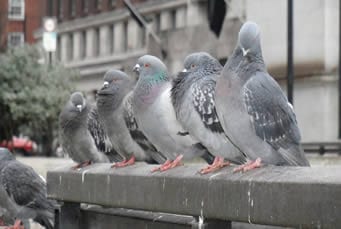
by Pigeon Patrol | Jul 12, 2021 | Bird Spike, history of pigeons, MBCA, pet bird, Pigeons, Pigeons in the News
Keeping this in view, how do pigeons survive in the city?
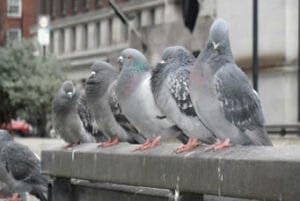
Pigeons (Rock Doves) adapt well to cities because they find there habitat similar to the cliffs where they live in the wild. If we were prepared to capture and eat them (not recommended today for health reasons) their populations would be much smaller of course.
Subsequently, question is, where do pigeons die? This background means that, when sick or injured, pigeons instinctively retreat to dark, remote places – ventilation systems, attics, building ledges – hoping to remain out of reach and unnoticed by predators. The predators don’t see them, but neither do we: often when pigeons expire, they are in hiding.
Keeping this in consideration, how long can a pigeon live?
Life Expectancy: Varies greatly from 3-5 years through to 15 years dependent on many factors, including natural predation and human interference. Predation: The wild pigeon is predated upon, almost exclusively, by the peregrine falcon, a bird that is also found living and breeding in coastal regions.
Do pigeons fight to the death?
As The Tom says, pigeons will defend their nest to the death under these circumstances. In a confined space this can quickly lead to the eggs becoming broken, or even the squabs being trampled to death in the ensuing skirmish.
Source
Pigeon Patrol Products & Services is the leading manufacturer and distributor of bird deterrent (control) products in Canada. Pigeon Patrol products have solved pest bird problems in industrial, commercial, and residential settings since 2000, by using safe and humane bird deterrents with only bird and animal friendly solutions. At Pigeon Patrol, we manufacture and offer a variety of bird deterrents, ranging from Ultra-flex Bird Spikes with UV protection, Bird Netting, 4-S Bird Gel and the best Ultrasonic and audible sound devices on the market today.
Voted Best Canadian wholesaler for Bird Deterrent products ten years in a row.
Contact us at 1- 877– 4– NO-BIRD, (604) 585-9279 or visit our website at www.pigeonpatrol.ca
Pigeon/Pigeon Patrol / Pigeons Roosting / Vancouver Pigeon Control /Bird Spikes / Bird Control / Bird Deterrent / Pigeon Deterrent? Surrey Pigeon Control / Pest /Seagull deterrent / Vancouver Pigeon Blog / Birds Inside Home / Pigeons in the cities / Ice Pigeons/ What to do about pigeons/ sparrows , Damage by Sparrows, How To Keep Raccoons Away, Why Are Raccoons Considered Pests/ De-fence / Pigeon Nesting/ Bird Droppings / Pigeon Dropping/ woodpecker control/ Professional Bird Control Company/ Keep The Birds Away/ Birds/rats/ seagull/pigeon/woodpecker/ dove/sparrow/pidgeon control/pidgeon problem/ pidgeon control/flying rats/ pigeon Problems/ bird netting/bird gel/bird spray/bird nails/ bird guard
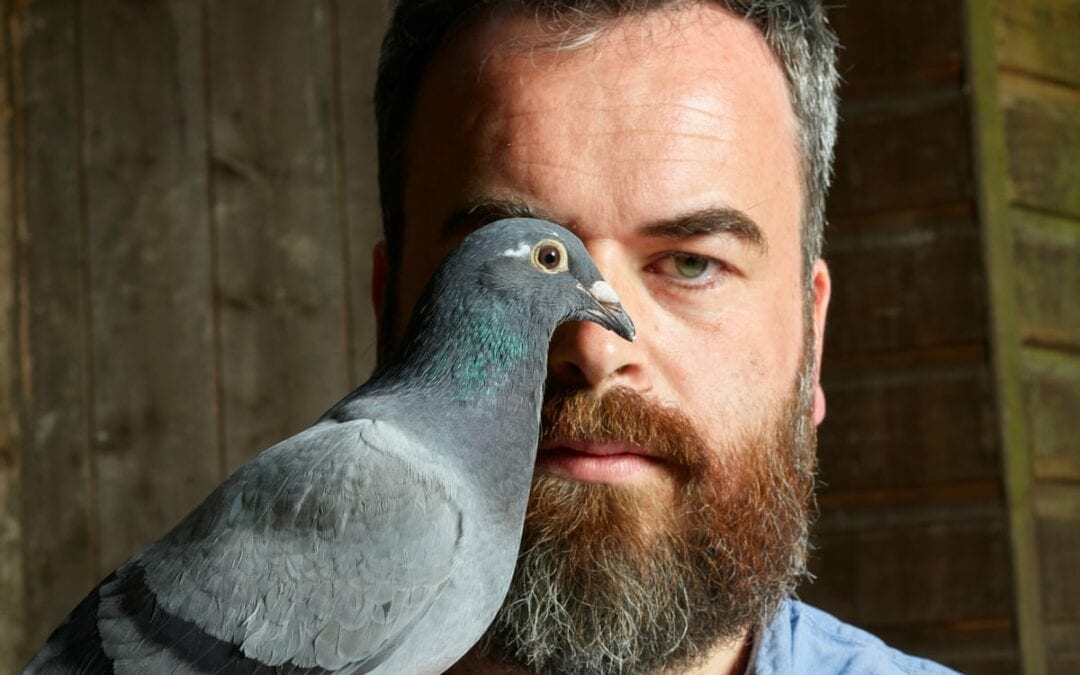
by Pigeon Patrol | Jul 12, 2021 | Doves, history of pigeons, MBCA, pet bird, Pigeon Control, Pigeon Predators
PLEASANTON — It turns out Homer’s odyssey ends in … Hayward.
The homing pigeon that walked into a Pleasanton bar on Memorial Day almost made it home from a race in Nevada — but didn’t quite get there. An injury or exhaustion landed the bird at the Y’all Come Back Saloon, where he surprised patrons with his brazen entrance into the neighborhood bar.
After an unsuccessful attempt to release the pigeon — he fluttered to the ground and didn’t go anywhere — Castro Valley resident Carol Batten tracked down a Medford, Ore., man whom she thought was the pigeon’s owner. And since Homer wasn’t going anywhere on his own, bar owner Maureen “Puff” Carpenson had lined up a ride to Oregon for the wayward pigeon.
But the day before the bird, christened Homer, was to leave for Oregon in an air-conditioned automobile, Batten and Carpenson learned the bird actually had been shipped to a new owner — a Hayward resident — last year.
Reese Bishop said he was surprised to hear from his friend, a pigeon breeder in Oregon, on Thursday night, asking if he had lost one of his birds. In fact, one of his pigeons did not make it back from the Lovelock, Nev., race over Memorial weekend.
He was even more surprised to learn that his pigeon was now famous as the bird who walked into a bar.
Bishop was expected to reunite with his bird late Friday. He laughed when he heard it had been dubbed Homer; since he owns 200 pigeons, it is impossible to name them all, he said.
Bishop has been racing pigeons for five years, and he says he has lost birds in the past.
“It happens,” he said. “Two years ago, I had a bird who was found in Los Angeles. He was supposed to be heading to my house from Nevada.”
After the first story appeared in MediaNews newspapers on Thursday, Carpenson said she received several phone calls from individuals warning her not to return the bird because it is considered useless to the owner.
“That is not true,” Bishop said. “We care about our birds. We put a lot of time and effort into them. There are a lot of feelings toward them.”
Larry Cook of the California State Racing Pigeon Organization noted that racing pigeons, depending on their breeding, can be worth anywhere from $500 to $1,000.
Cook, who has been racing pigeons for 29 years, said he has had pigeons get lost, then found and subsequently shipped back to his Exeter home.
For now, Homer the pigeon will be “put out to pasture” so he can recover, Bishop said.
After that, Bishop will decide whether to breed him or hand him over to a racer just starting out in the hobby.
As for that pigeon who turned up in Los Angeles a few years ago? He’s racing again.
Source
Pigeon Patrol Products & Services is the leading manufacturer and distributor of bird deterrent (control) products in Canada. Pigeon Patrol products have solved pest bird problems in industrial, commercial, and residential settings since 2000, by using safe and humane bird deterrents with only bird and animal friendly solutions. At Pigeon Patrol, we manufacture and offer a variety of bird deterrents, ranging from Ultra-flex Bird Spikes with UV protection, Bird Netting, 4-S Bird Gel and the best Ultrasonic and audible sound devices on the market today.
Voted Best Canadian wholesaler for Bird Deterrent products ten years in a row.
Contact us at 1- 877– 4– NO-BIRD, (604) 585-9279 or visit our website at www.pigeonpatrol.ca
Pigeon/Pigeon Patrol / Pigeons Roosting / Vancouver Pigeon Control /Bird Spikes / Bird Control / Bird Deterrent / Pigeon Deterrent? Surrey Pigeon Control / Pest /Seagull deterrent / Vancouver Pigeon Blog / Birds Inside Home / Pigeons in the cities / Ice Pigeons/ What to do about pigeons/ sparrows , Damage by Sparrows, How To Keep Raccoons Away, Why Are Raccoons Considered Pests/ De-fence / Pigeon Nesting/ Bird Droppings / Pigeon Dropping/ woodpecker control/ Professional Bird Control Company/ Keep The Birds Away/ Birds/rats/ seagull/pigeon/woodpecker/ dove/sparrow/pidgeon control/pidgeon problem/ pidgeon control/flying rats/ pigeon Problems/ bird netting/bird gel/bird spray/bird nails/ bird guard

by Pigeon Patrol | Jul 12, 2021 | Pigeon Spikes, Pigeons, Pigeons in the News, Raccoons, Sparrows, UltraSonic Bird Control
Canberra, Australia — A pigeon that Australia declared a biosecurity risk has received a reprieve after a U.S. bird organization declared its identifying leg band was fake.
The band suggested the bird found in a Melbourne backyard on Dec. 26 was a racing pigeon that had left Oregon, 8,000 miles away, two months earlier.
On that basis, Australian authorities on Thursday said they considered the bird a disease risk and planned to kill it.
But Deone Roberts, sport development manager for the Oklahoma-based American Racing Pigeon Union, said on Friday the band was fake.
The band number belongs to a blue bar pigeon in the United States and that is not the bird pictured in Australia, she said.
“The bird band in Australia is counterfeit and not traceable,” Roberts said. “It definitely has a home in Australia and not the U.S.”
“Somebody needs to look at that band and then understand that the bird is not from the U.S. They do not need to kill him,” she added.
Australia’s Agriculture Department, which is responsible for biosecurity, agreed that the pigeon dubbed Joe, after U.S. President-elect Joe Biden, was wearing a “fraudulent copy” leg band.
“Following an investigation, the department has concluded that Joe the Pigeon is highly likely to be Australian and does not present a biosecurity risk,” it said in a statement.
The department said it will take no further action.
Acting Australian Prime Minister Michael McCormack had earlier said there would be no mercy if the pigeon was from the United States.
“If Joe has come in a way that has not met our strict biosecurity measures, then bad luck Joe, either fly home or face the consequences,” McCormack said.
Martin Foley, health minister for Victoria state, where Joe is living, had called for the federal government to spare the bird even if it posed a disease risk.
“I would urge the Commonwealth’s quarantine officials to show a little bit of compassion,” Foley said.
Andy Meddick, a Victorian lawmaker for the minor Animal Justice Party, called for a “pigeon pardon for Joe.”
“Should the federal government allow Joe to live, I am happy to seek assurances that he is not a flight risk,” Meddick said.
Melbourne resident Kevin Celli-Bird, who found the emaciated bird in his backyard, was surprised by the change of nationality but pleased that the bird he named Joe would not be destroyed.
“I thought this is just a feel-good story and now you guys want to put this pigeon away and I thought it’s not on, you know, you can’t do that, there has got to be other options,” Celli-Bird said of the threat to euthanize.
Celli-Bird had contacted the American Racing Pigeon Union to find the bird’s owner based on the number on the leg band. The bands have both a number and a symbol, but Celli-Bird didn’t remember the symbol and said he can no longer catch the bird since it has recovered from its initial weakness.
The bird with the genuine leg band had disappeared from a 350-mile race in Oregon on Oct. 29, Crooked River Challenge owner Lucas Cramer said.
That bird did not have a racing record that would make it valuable enough to steal its identity, he said.
“That bird didn’t finish the race series, it didn’t make any money and so its worthless, really,” Cramer said.
Counterfeiting bird bands is “happening more and more,” Roberts said. “People coming into the hobby unknowingly buy that.”
Pigeon racing has seen a resurgence in popularity, and some birds have become quite valuable. A Chinese pigeon racing fan put down a record price of $1.9 million in November for a Belgian-bred pigeon.
Cramer said it was possible a pigeon could cross the Pacific on a ship from Oregon to Australia.
“In reality, it could potentially happen, but this isn’t the same pigeon. It’s not even a racing pigeon,” Cramer said.
The bird spends every day in the backyard, sometimes with a native dove on a pergola.
“I might have to change him to Aussie Joe, but he’s just the same pigeon,” Celli-Bird said.
Lars Scott, a carer at Pigeon Rescue Melbourne, a bird welfare group, said pigeons with American leg bans were not uncommon around the city. A number of Melbourne breeders bought them online and used them for their own record keeping, Scott said.
Australian quarantine authorities are notoriously strict. In 2015, the government threatened to euthanize two Yorkshire terriers, Pistol and Boo, after they were smuggled into the country by Hollywood star Johnny Depp and his now-ex-wife Amber Heard.
Faced with a 50-hour deadline to leave Australia, the dogs made it out in a chartered jet.
Source
Pigeon Patrol Products & Services is the leading manufacturer and distributor of bird deterrent (control) products in Canada. Pigeon Patrol products have solved pest bird problems in industrial, commercial, and residential settings since 2000, by using safe and humane bird deterrents with only bird and animal friendly solutions. At Pigeon Patrol, we manufacture and offer a variety of bird deterrents, ranging from Ultra-flex Bird Spikes with UV protection, Bird Netting, 4-S Bird Gel and the best Ultrasonic and audible sound devices on the market today.
Voted Best Canadian wholesaler for Bird Deterrent products ten years in a row.
Contact us at 1- 877– 4– NO-BIRD, (604) 585-9279 or visit our website at www.pigeonpatrol.ca
Pigeon/Pigeon Patrol / Pigeons Roosting / Vancouver Pigeon Control /Bird Spikes / Bird Control / Bird Deterrent / Pigeon Deterrent? Surrey Pigeon Control / Pest /Seagull deterrent / Vancouver Pigeon Blog / Birds Inside Home / Pigeons in the cities / Ice Pigeons/ What to do about pigeons/ sparrows , Damage by Sparrows, How To Keep Raccoons Away, Why Are Raccoons Considered Pests/ De-fence / Pigeon Nesting/ Bird Droppings / Pigeon Dropping/ woodpecker control/ Professional Bird Control Company/ Keep The Birds Away/ Birds/rats/ seagull/pigeon/woodpecker/ dove/sparrow/pidgeon control/pidgeon problem/ pidgeon control/flying rats/ pigeon Problems/ bird netting/bird gel/bird spray/bird nails/ bird guard
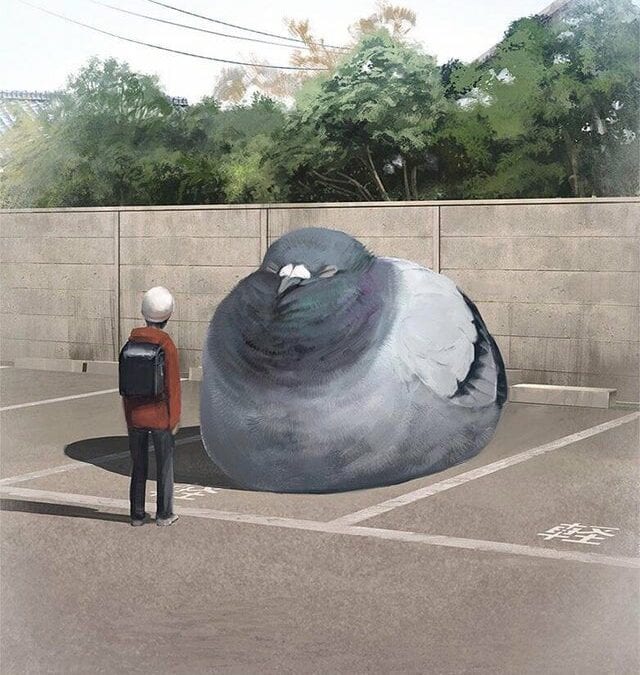
by Pigeon Patrol | Jul 12, 2021 | Bird Deterrent Products, Bird Law, Bird Netting, Bird Spikes, Columbidae, Doves
ST. PAUL, Minn.–Pounded and strained by heavy traffic and weakened by missing bolts and cracking steel, the failed interstate bridge over the Mississippi River also faced a less obvious enemy: Birds, specifically pigeons.
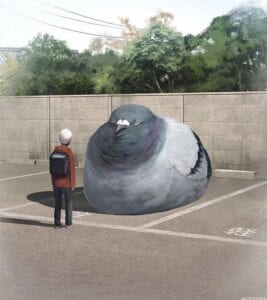
Inspectors began documenting the build-up of pigeon dung on the span near downtown Minneapolis two decades ago.
Experts say the corrosive guano deposited all over the bridge’s framework helped the steel beams rust faster.
Although investigators have yet to identify the cause of the bridge’s Aug. 1 collapse, which killed at least 13 people and injured about 100, the pigeon problem is one of many factors that dogged the structure.
“There is a coating of pigeon dung on steel with nest and heavy build-up on the inside hollow box sections,” inspectors wrote in a 1987-1989 report.
In 1996, screens were installed over openings in the bridge’s beams to keep pigeons from nesting there, but that didn’t prevent the build-up of droppings elsewhere.
Pigeon droppings contain ammonia and acids, said chemist Neal Langerman, of the American Chemical Society. If the dung isn’t washed away, it dries out and turns into a concentrated salt. When water gets in and combines with the salt and ammonia, it creates small electrochemical reactions that rust the steel underneath.
“Every time you get a little bit of moisture there, you wind up having a little bit of electrochemistry occurring and you wind up with corrosion,” said Langerman. “Over a long term, it might in fact cause structural weaknesses.”
Langerman emphasized that he wasn’t saying absolutely that pigeon dung factored into the collapse of the bridge, but the problem is familiar to bridge inspectors everywhere.
The Colorado Department of Transportation spent so much time cleaning pigeon manure off bridges that it’s researching new ways to keep the birds away from its spans.
Source
Pigeon Patrol Products & Services is the leading manufacturer and distributor of bird deterrent (control) products in Canada. Pigeon Patrol products have solved pest bird problems in industrial, commercial, and residential settings since 2000, by using safe and humane bird deterrents with only bird and animal friendly solutions. At Pigeon Patrol, we manufacture and offer a variety of bird deterrents, ranging from Ultra-flex Bird Spikes with UV protection, Bird Netting, 4-S Bird Gel and the best Ultrasonic and audible sound devices on the market today.
Voted Best Canadian wholesaler for Bird Deterrent products ten years in a row.
Contact us at 1- 877– 4– NO-BIRD, (604) 585-9279 or visit our website at www.pigeonpatrol.ca
Pigeon/Pigeon Patrol / Pigeons Roosting / Vancouver Pigeon Control /Bird Spikes / Bird Control / Bird Deterrent / Pigeon Deterrent? Surrey Pigeon Control / Pest /Seagull deterrent / Vancouver Pigeon Blog / Birds Inside Home / Pigeons in the cities / Ice Pigeons/ What to do about pigeons/ sparrows , Damage by Sparrows, How To Keep Raccoons Away, Why Are Raccoons Considered Pests/ De-fence / Pigeon Nesting/ Bird Droppings / Pigeon Dropping/ woodpecker control/ Professional Bird Control Company/ Keep The Birds Away/ Birds/rats/ seagull/pigeon/woodpecker/ dove/sparrow/pidgeon control/pidgeon problem/ pidgeon control/flying rats/ pigeon Problems/ bird netting/bird gel/bird spray/bird nails/ bird guard

by Pigeon Patrol | Jul 5, 2021 | MBCA, pet bird, Pigeon Control, Pigeon Droppings, Pigeon Patrol's Services, Pigeon Predators
Heavily armed shock troops took to the streets of Downtown, police officers barked at pedestrians to take cover and Pittsburgh’s mayor donned a bulletproof vest yesterday afternoon as reports of a sniper in the heart of the business district triggered a massive police response and paralyzed both commerce and traffic.
Several nervous callers to 911 had described a man with a bushy beard carrying a rifle with a scope and pointing it out the windows of a building in the 500 block of Penn Avenue.
Police closed off streets. Inbound lanes of the Fort Pitt Bridge were closed to traffic, as were ramps leading to Downtown from the Fort Duquesne Bridge. A Port Authority Police officer armed with an AR-15 rifle stood guard at Penn Avenue and Stanwix Street.
It was a surreal incident, a surreal response and, fittingly, a surreal ending.
There was no sniper after all, only a maintenance man at the Pittsburgh Allegheny County Thermal plant shooting at pigeons inside the 10-story facility with a pellet rifle.
Police declined to identify the man. But PACT president Robert Fazio said he was Richard Wills, an “excellent” longtime employee who has worked single-handedly for several years to eradicate the plant’s pigeon problem after poison and plastic owls proved unsuccessful. PACT provides steam heat for buildings throughout Downtown.
When police discovered that tidbit of information, they also learned another. Despite the rapid response and overwhelming police presence, the worker, a Fayette County resident, had quietly left, possibly oblivious to the uproar he had caused.
Mr. Wills could not be reached for comment last night.
Police spokeswoman Tammy Ewin said it was unlikely the man would be arrested. The only charge likely to stem from the incident could be a citation if it were determined he fired the gun illegally inside the city limits, Ms. Ewin said.
Chief Dominic J. Costa, who was Downtown along with Mayor Bob O’Connor and other top local officials, said merely carrying a pellet rifle Downtown might not be against the law. However, he added, it flew in the face of common sense.
“Look at the alarm he caused. Look at all the inconvenience he caused,” Chief Costa said.
Until police determined roughly two hours into the incident that there was no imminent danger, they took no chances.
The event began around 1:05 p.m., apparently after a witness saw a man with a rifle inside a building on Penn Avenue. Then a police dispatcher broadcast information about a gunman with a rifle and a scope on the fourth floor of a building at Penn and Cecil Way, an alley running from Penn to Fort Duquesne Boulevard. Another dispatch had the man wearing some type of light strapped to his shoulder.
Officers shut Penn Avenue, Fort Duquesne Boulevard and Liberty Avenue from Stanwix to Sixth streets and posted officers at the intersections.
“Folks, you need to either move to the right or the left,” bellowed one motorcycle officer to a group of pedestrians on Stanwix Street. “This guy has a high-powered rifle.”
About 100 Highmark Life and Casualty employees were told to keep clear of the windows of their floor in 515 Penn Ave., which faced the building at 525 Penn Ave., where the incident was taking place.
They remained in the building for two hours, tracking the unfolding events on the Internet, television and phone calls from the outside, said staffer Carol Hunter.
The shutdown paralyzed some businesses both inside and outside the taped-off police perimeter. One exception was the Sixth Penn bistro, where the five-person kitchen crew remained busy hustling out orders of meatloaf, crabcake and Reuben sandwiches all afternoon.
“Customers were enjoying hanging out,” said fry cook Chris Eggleton, 32. “People took it as an extended lunch at the expense of a sniper.”
At the Fifth Avenue Beanery coffee shop, customers presumably were “just sitting at the tables or walking back and forth, talking on their cell phones,” said Manager Mary Ann Keating. “People were more frustrated about what was going on. They wanted out and they weren’t allowed out.”
For a time, police had trouble locating the right building. Adding to the confusion were later dispatches that the suspect might be walking away carrying a duffel bag or a backpack.
Eventually, police focused on the PACT complex, two buildings along Fort Duquesne Boulevard and Cecil Way that share a common wall.
As surveillance continued, police swarmed Downtown in droves. Unmarked cars pulled up, one after the other, as members of the Special Emergency Response Team exited, donned body armor and unloaded heavy weapons. Snipers took up positions.
A state police helicopter whirred overhead. The bomb squad arrived. Allegheny County Sheriff Peter R. DeFazio and Chief Executive Dan Onorato showed up.
And Mr. O’Connor, whose wife, Judy, was at work in the hot zone, ran across Penn Avenue shielded by his bodyguard, Officer Joseph Ryczaj, to check on her.
Authorities established a command post in the lobby of Fifth Avenue Place, where a police robot rolled over the lobby floor.

“It’s kind of crazy,” said Tara Bingaman, 28, of North Huntingdon, a student at Point Park University who wandered over to Stanwix Street to witness the hubbub.
Around 2:20 p.m., SERT officers marched out of Fifth Avenue Place. Mr. O’Connor, whose white hair stood in contrast to the officers’ black outfits, stood at the end of their line. The officers made their way around the corner onto Penn and down Cecil Way.
Eventually, they entered the PACT building shortly before 3 p.m. and found a foreman who told them the description of the man with a gun matched that of an employee who shoots pigeons with a pellet rifle and a scope.
Mr. Fazio said Mr. Wills used his own pellet rifle — which he stores at the plant — to clear out pigeons who roost in the building’s rafters and rain droppings down on the machinery.
“We do have an internal building pigeon problem. The pigeons come into our building and from time to time one of our employees has used a pellet rifle to get rid of pigeons inside our building only,” Mr. Fazio said.
Patrons at Caffe Amante, a restaurant on the second floor of Fifth Avenue Place, had been finishing lunches or heading back to work when police poured into the area and ordered the building shut down. So they headed back to the restaurant, which overlooks Penn Avenue and Stanwix Street, to cluster around the television and watch news reports about the situation unfolding on the streets around them.
“It was confusing and more than a little aggravating,” manager Debbie Doucette said. “Now that it turns out to be a pellet gun, I’m really aggravated. We were all held up for two hours for pigeons and pellet guns.”
Source
Pigeon Patrol Products & Services is the leading manufacturer and distributor of bird deterrent (control) products in Canada. Pigeon Patrol products have solved pest bird problems in industrial, commercial, and residential settings since 2000, by using safe and humane bird deterrents with only bird and animal friendly solutions. At Pigeon Patrol, we manufacture and offer a variety of bird deterrents, ranging from Ultra-flex Bird Spikes with UV protection, Bird Netting, 4-S Bird Gel and the best Ultrasonic and audible sound devices on the market today.
Voted Best Canadian wholesaler for Bird Deterrent products ten years in a row.
Contact us at 1- 877– 4– NO-BIRD, (604) 585-9279 or visit our website at www.pigeonpatrol.ca
Pigeon/Pigeon Patrol / Pigeons Roosting / Vancouver Pigeon Control /Bird Spikes / Bird Control / Bird Deterrent / Pigeon Deterrent? Surrey Pigeon Control / Pest /Seagull deterrent / Vancouver Pigeon Blog / Birds Inside Home / Pigeons in the cities / Ice Pigeons/ What to do about pigeons/ sparrows , Damage by Sparrows, How To Keep Raccoons Away, Why Are Raccoons Considered Pests/ De-fence / Pigeon Nesting/ Bird Droppings / Pigeon Dropping/ woodpecker control/ Professional Bird Control Company/ Keep The Birds Away/ Birds/rats/ seagull/pigeon/woodpecker/ dove/sparrow/pidgeon control/pidgeon problem/ pidgeon control/flying rats/ pigeon Problems/ bird netting/bird gel/bird spray/bird nails/ bird guard
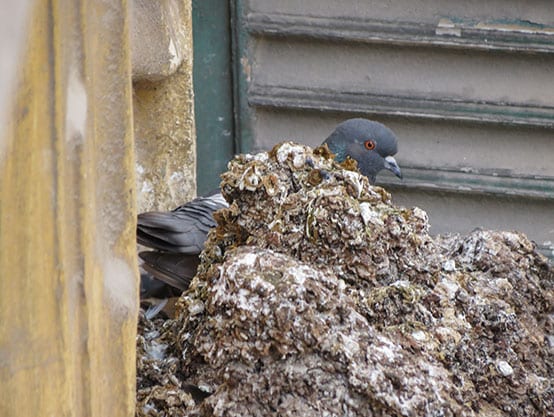
by Pigeon Patrol | Jul 5, 2021 | pet bird, Pigeon Control, Pigeon Droppings, Pigeon Patrol's Services, Pigeon Predators
What Is Bird Flu?
Bird flu, or avian influenza, is a viral infection spread from bird to bird. The most common kind of bird flu is the H5N1 strain. It’s mostly a threat to birds and doesn’t spread easily among people, but there was a major outbreak of bird flu in people in 2014. The very few cases of human-to-human transmission were among people with exceptionally close contact, such as a mother who caught the virus while caring for their sick infant.
Migrating water fowl — most notably wild ducks — are the natural carriers of bird flu viruses. It’s suspected that infection can spread from wild fowl to domestic poultry.
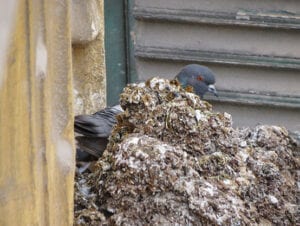
a pigeon bird standing by guano manure
How Do Humans Get Bird Flu?
People catch bird flu by close contact with birds or bird droppings.
In the 2014 outbreak, some people caught H5N1 from cleaning or plucking infected birds. There were reports in China of infection via inhalation of aerosolized materials in live bird markets. It’s also possible that some people were infected after swimming or bathing in water contaminated with the droppings of infected birds. And some infections have occurred in people who handle fighting cocks.
People don’t catch the virus from eating fully cooked chicken or eggs.
There were a few cases where one infected person caught the bird flu virus from another person, but only after close personal contact.
In Indonesia in 2006, bird flu spread to eight members of one family. Seven of them died. It’s not clear exactly how this happened. Family members likely had similar contacts with infected birds. They may also have shared genes that made them particularly susceptible to the virus. However, casual contact does not seem to be involved.
Has Bird Flu Been Seen in the U.S.?
Various strains of bird flu pop up in U.S. poultry from time to time. When they do, all affected poultry flocks are culled.
For example, in 2004, a highly dangerous bird flu strain appeared in a Texas chicken flock. The outbreak involved an H5N2 virus (not the H5N1 bird flu). By April 2004, the outbreak had been eradicated. No human infections were detected.
What Are the Symptoms of Bird Flu in People?
Bird flu symptoms in people can vary. It may start out with normal flu-like symptoms. Sometimes, this can worsen to become a severe respiratory disease that can be fatal.
In February 2005, researchers in Vietnam reported human cases of bird flu in which the virus infected the brain and digestive tract of two children. Both died. These cases show that bird flu in humans may not always look like typical cases of flu.
Is There a Bird Flu Vaccine?
Yes. The FDA approved the first vaccine to prevent human infection with one strain of the bird flu in 2007. But it’s not been made commercially available to the general public. The U.S. government purchased the vaccine in case it needed to be distributed by public health officials.
Is There a Treatment for Bird Flu?
The flu drugs oseltamivir (Tamiflu), peramivir (Rapivab), or zanamivir (Relenza) may help treat bird flu in people, although more studies are needed. These drugs must be given soon after symptoms appear.
Source
Pigeon Patrol Products & Services is the leading manufacturer and distributor of bird deterrent (control) products in Canada. Pigeon Patrol products have solved pest bird problems in industrial, commercial, and residential settings since 2000, by using safe and humane bird deterrents with only bird and animal friendly solutions. At Pigeon Patrol, we manufacture and offer a variety of bird deterrents, ranging from Ultra-flex Bird Spikes with UV protection, Bird Netting, 4-S Bird Gel and the best Ultrasonic and audible sound devices on the market today.
Voted Best Canadian wholesaler for Bird Deterrent products ten years in a row.
Contact us at 1- 877– 4– NO-BIRD, (604) 585-9279 or visit our website at www.pigeonpatrol.ca
Pigeon/Pigeon Patrol / Pigeons Roosting / Vancouver Pigeon Control /Bird Spikes / Bird Control / Bird Deterrent / Pigeon Deterrent? Surrey Pigeon Control / Pest /Seagull deterrent / Vancouver Pigeon Blog / Birds Inside Home / Pigeons in the cities / Ice Pigeons/ What to do about pigeons/ sparrows , Damage by Sparrows, How To Keep Raccoons Away, Why Are Raccoons Considered Pests/ De-fence / Pigeon Nesting/ Bird Droppings / Pigeon Dropping/ woodpecker control/ Professional Bird Control Company/ Keep The Birds Away/ Birds/rats/ seagull/pigeon/woodpecker/ dove/sparrow/pidgeon control/pidgeon problem/ pidgeon control/flying rats/ pigeon Problems/ bird netting/bird gel/bird spray/bird nails/ bird guard

by Pigeon Patrol | Jul 5, 2021 | Pigeon Predators, Pigeon Spikes, Pigeons, Pigeons in the News, Raccoons, Sparrows, UltraSonic Bird Control
If you saw Mary Poppins as a child and remember hearing ‘Feed the birds, tuppins a bag’ you probably thought that feeding the pigeons was a rather altruistic activity. Think again. ‘Pigeons are degrading the city,’ says Florence’s Environmental Assessor, Claudio Del Lungo, who recently passed an ordinance prohibiting the feeding of street birds. Fines are 50 Euro for anyone who feeds pigeons in the plaza or ducks along the Arno. The ordinance was issued in response to complaints from citizens about the worsening pigeon problem. According to Del Lungo, they attract rodents and insects, deteriorate hygiene conditions and damage buildings and monuments.
As for the ducks, Del Lungo worries about their diet. He argues that people tend to overfeed ducks, perhaps killing them as a result. As is true for pigeons, food thrown into the Arno also attracts animals that will only cause the river to become dirty and pest-ridden.
This ordinance will be adopted by other cities in Italy as well. The objective is to cut costs related to sterilization, which is often ineffective. There are, however, four exceptions to the newly passed ordinance. They are: feeding grain to wild birds in agricultural areas; in private areas using bird feeders; under community administration; or while the birds are being monitored with ASL staff or other sanitary personnel—but never, ever in the piazza.
Source
Pigeon Patrol Products & Services is the leading manufacturer and distributor of bird deterrent (control) products in Canada. Pigeon Patrol products have solved pest bird problems in industrial, commercial, and residential settings since 2000, by using safe and humane bird deterrents with only bird and animal friendly solutions. At Pigeon Patrol, we manufacture and offer a variety of bird deterrents, ranging from Ultra-flex Bird Spikes with UV protection, Bird Netting, 4-S Bird Gel and the best Ultrasonic and audible sound devices on the market today.
Voted Best Canadian wholesaler for Bird Deterrent products ten years in a row.
Contact us at 1- 877– 4– NO-BIRD, (604) 585-9279 or visit our website at www.pigeonpatrol.ca
Pigeon/Pigeon Patrol / Pigeons Roosting / Vancouver Pigeon Control /Bird Spikes / Bird Control / Bird Deterrent / Pigeon Deterrent? Surrey Pigeon Control / Pest /Seagull deterrent / Vancouver Pigeon Blog / Birds Inside Home / Pigeons in the cities / Ice Pigeons/ What to do about pigeons/ sparrows , Damage by Sparrows, How To Keep Raccoons Away, Why Are Raccoons Considered Pests/ De-fence / Pigeon Nesting/ Bird Droppings / Pigeon Dropping/ woodpecker control/ Professional Bird Control Company/ Keep The Birds Away/ Birds/rats/ seagull/pigeon/woodpecker/ dove/sparrow/pidgeon control/pidgeon problem/ pidgeon control/flying rats/ pigeon Problems/ bird netting/bird gel/bird spray/bird nails/ bird guard
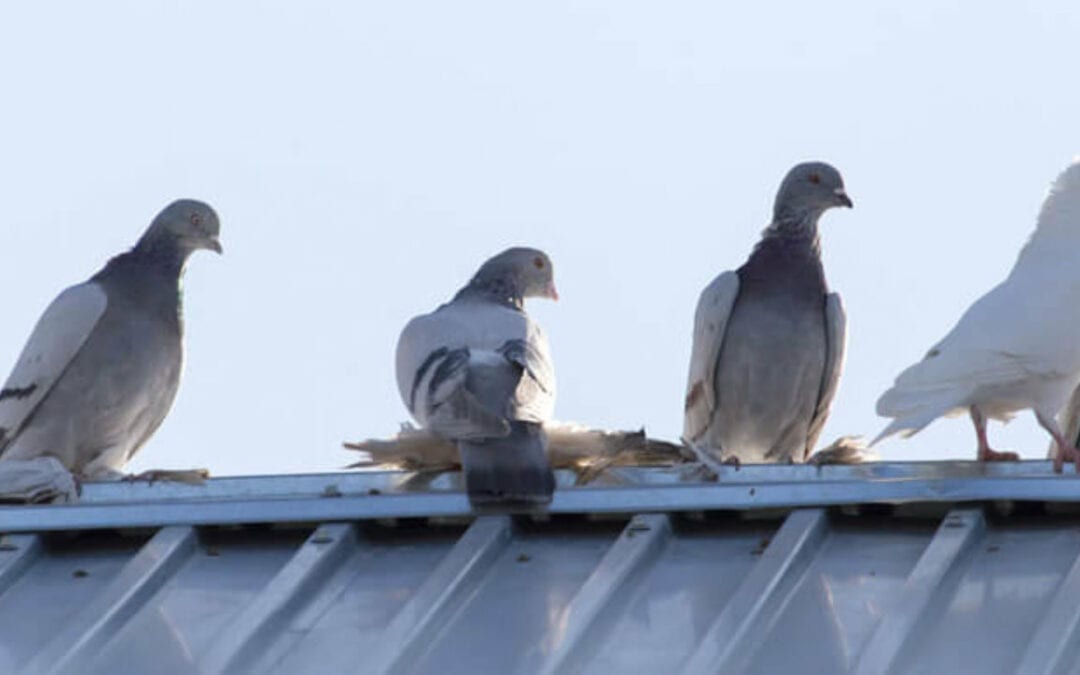
by Pigeon Patrol | Jul 5, 2021 | 4-S Gel Bird repellent, Animal Deterrent Products, Bird Deterrent Products, Bird Law, Bird Netting, Bird Spikes
A little experiment: What comes to mind when you hear the word “dove”?
Intimations of peace? The promise of hope after long hardship, à la Noah releasing a snow-white bird to gauge the waters of the flood? A kick-ass ice cream bar? Whatever the image, the association is likely positive. Beatific, even.
Now try another word. “Pigeon.”
If you’re like most people — and especially if you’re like most city dwellers — you probably get a bit skeeved out just hearing the word. Pigeons? They might not be vermin — not exactly — but they aren’t too far up the ladder, either. They eat trash. They crap everywhere. Stupid. Filthy. Rats with wings. Right? Sorry, but not quite. In fact, not even close. And thanks to Andrew Blechman’s consistently engaging and surprising new book, “Pigeons,” the seemingly dull, unlovely members of the Columbidae family — or, rather, their idiosyncratic and intensely loyal human proponents — now have a handy arsenal of lively anecdotes and plain old facts (heads up, wisenheimers: Pigeons are doves) with which to defend their long-maligned feathered friends.
Along the way, Blechman takes pains to chronicle the views of people for whom pigeons are, at best, a nuisance and, at worst, a plague. He spends a cold, taxing day in rural Pennsylvania among a community of men, women and children who enthusiastically and unapologetically shoot pigeons for sport, for food and even for charity. He chats with the owner of a South Carolina squab-processing plant for whom the birds are nothing more than meat divinely destined for ovens, frying pans and human gullets. (“All he cares about,” Blechman writes, “are breasts, because that’s where the meat is. ‘I want nice, well-rounded ones,’ he tells me. ‘I want big breasts.'”) And, evidently without having to search too far, Blechman finds and dutifully quotes those who, for reasons as numerous as bread crumbs in St. Mark’s Square, simply despise the red-legged head-bobbers that have learned to live (and, more universally than their human counterparts, thrive) amid the chaos of modern metropolises.

But despite his fair and balanced reporting on the many detractors of, as his book’s subtitle has it, “The World’s Most Revered and Reviled Bird,” make no mistake — Blechman himself is a Columbidae family man. While he was, by his own admission, neither anti- nor pro-pigeon when he began the peripatetic journey traced in the book, something clearly happened during his wanderings through the variegated, far-flung worlds of pigeonistas. Yes, the author dutifully records the myriad arguments for the bird’s obliteration. Sure, he eats fried pigeon, and enjoys it. Admittedly, he readies, aims and fires a shotgun at pigeons, and experiences the thrill of the hunt — or, more exactly, the thrill of standing still and blasting away at birds released from spring-loaded traps. But almost before the reader has settled in and begun to enjoy Blechman’s disarming, conversational style (“Some people like pigeons. But pigeons also piss a lot of people off”), the author’s enthusiasm for his subject starts flying right off the page. One almost pictures him beating imaginary wings as he expounds on the pigeon’s mind-boggling physical attributes and capabilities:
“With hollow bones containing reservoirs of oxygen, a tapered fuselage, giant breast muscles that account for one-third of its body mass, and an ability to function indefinitely without sleep, the rock dove [as many ornithologists have begun referring to the bird] is a feathered rocket built for speed and endurance. If an average up-and-down of the wing takes the bird three feet, then a racer is making roughly 900,000 of those motions during a long-distance race, while maintaining 600 heartbeats per minute — triple its resting rate. The rock dove can reach peak velocity in seconds and maintain it for hours on end. One pigeon was recorded flying for several hours at 110 mph — an Olympian feat by any measure.”
That Blechman repeats, with only slight variations, this litany of athletic gifts throughout the book is one of the few aspects of the tale that grows old. We get it! Pigeons are incredibly fast fliers that can remain on the wing at top speed for hours on end on the avian equivalent of fumes. Is there really anything more of interest to say about the animal? What else has it got? And does the creature actually warrant writing, and reading, a whole book?
Pigeons, it turns out, have lived closely with humans, in a perpetually evolving relationship — first as a handy and docile source of protein, then as an incomparably fast means of transferring information and, finally, as a focus of sport (racing and shooting) and a pastime (show breeding) — for perhaps 10,000 years. They’ve served as symbols of fertility, peace and renewal in religions from Christianity and Judaism to Greek, Babylonian and other Mediterranean and Middle Eastern cults and creeds, while practitioners of yoga have long invoked the bird’s winged shape while assuming poses like the One-Legged King Pigeon.
For millennia, rock doves helped lost seafarers point their crafts toward land when lost, for even though the bird “often dwells on coastal cliffs, it has an aversion to large bodies of water and always flies inland in search of food. A bird released from a ship will quickly orient itself to land, and early sailors undoubtedly followed suit.”
Of course, the bird’s astonishing homing skills have been used for as long as, if not longer than, recorded history to carry messages of victory (and defeat) in war, announcements of the ascension of new kings and pharaohs to the throne, and even warnings of floods along the Nile. Underground coops discovered in Israel, dating from the time of King Solomon, held an estimated 120,000 pigeons — at least a few of which were, presumably, used for purposes other than keeping David and Bathsheba’s son and his friends readily supplied with squab.
And then there’s the tale of the creation of one of the world’s largest news companies. It all started when a failed German businessman named Israel Beer Josaphat hit upon the idea of tying tiny little bags stuffed with news and stock market prices beneath the wings of homing pigeons flown between Brussels and Aachen, Germany. The train between the cities took eight hours, the birds less than two. Josaphat ultimately changed his name to Julius Reuter and created a news-gathering empire founded on (or beneath) the wings of rock doves.
But as edifying as these historical tidbits might be, and as much about the rock dove as the book might appear to be, the story of “Pigeons” is, ultimately, one of how people respond to the bird. In the best sense, Blechman’s book reads like a series of entertaining, eye-opening magazine pieces held together by the sinews, feathers and strong, hollow bones of the rock dove. Like so many of the surprisingly enthralling books written in recent years about one discrete, at-first-glance vapid topic — Mark Kurlansky’s “Cod,” Charles Seife’s “Zero: The Biography of a Dangerous Idea,” and innumerable others — “Pigeons” manages to illuminate not merely the ostensible subject of the book, but also something of the endearing, repellent, heroic and dastardly nature of that most bizarre of breeds, Homo sapiens.
Blechman has a shrewd eye and an ear nicely attuned to the peculiarities that reveal personality, and the human characters populating the pages of “Pigeons” are wonderfully and sympathetically drawn. From the friendly, unassuming pigeon breeders at the Grand Nationals competition held at a Lancaster, Pa., hotel, to the clearly obsessed trainers and owners of racing pigeons in the Bronx and rural England and beyond, to the happy, driven rescuer and champion of rock doves who lives in a squalid home in Arizona literally dripping with not-quite-calcified pigeon shit, the pro-bird folks who pop up in “Pigeons” make avid cat and dog people seem, well, tame in comparison.
“Sweetie, a pigeon the size of a small turkey, is pacing back and forth on what used to be a Formica kitchen counter,” Blechman writes of a bird who makes her home with Dave Roth, the one-man rescue mission and Jerry Garcia look-alike of Phoenix, Ariz. “Roth nuzzles her. ‘That’s my girl. You’re such a sweetie, aren’t you?’ He turns to face me. ‘If everybody could experience this kind of a relationship with a bird, then we wouldn’t have all the problems we have today with the pigeon haters. Pigeons can be funny, animated, and loyal like a dog. You’d be amazed.'”
This kitchen counter encounter, which appears at just about the exact halfway point of the book, is emblematic of much that’s weird and humorous and even a little unsettling about Blechman’s tale. If you’re somehow still on the fence about pigeons until this point, you’ll probably fall hard and fast on either side once you’ve spent a little time with Dave Roth. (Of eating squab, Roth opines that it’s “like Jeffrey Dahmer eating your kid.” Roth, it’s worth noting, is a bachelor. And childless.)
Finally, as fate would have it, at pretty much the exact same time that Blechman’s book was hitting bookstores, several research studies found that (wait for it) pigeons are vastly more intelligent than anyone, even most pigeon fans, have given them credit for.
“Pigeons are no slouches,” said Robert G. Cook of Tufts University, coauthor of a study that found that pigeons can remember more than 1,000 individual images. Another study showed that pigeons evidently possess the ability to compare relationships — such as sameness or difference — rather than merely identifying distinct images or objects. Researchers claimed that the ability, previously observed and quantified only in humans and a handful of other higher mammals, is a form of analogous thinking — primitive, but nonetheless exceedingly rare in the animal kingdom.
Rats with wings? Affectionate companions? Idiotic pests? Miraculous navigators? Tasty eats? Blechman’s “Pigeons” flies in the face of conventional wisdom about a symbolically freighted bird that, if we thought about it at all, we thought we knew. Time to think again.
Source
Pigeon Patrol Products & Services is the leading manufacturer and distributor of bird deterrent (control) products in Canada. Pigeon Patrol products have solved pest bird problems in industrial, commercial, and residential settings since 2000, by using safe and humane bird deterrents with only bird and animal friendly solutions. At Pigeon Patrol, we manufacture and offer a variety of bird deterrents, ranging from Ultra-flex Bird Spikes with UV protection, Bird Netting, 4-S Bird Gel and the best Ultrasonic and audible sound devices on the market today.
Voted Best Canadian wholesaler for Bird Deterrent products ten years in a row.
Contact us at 1- 877– 4– NO-BIRD, (604) 585-9279 or visit our website at www.pigeonpatrol.ca
Pigeon/Pigeon Patrol / Pigeons Roosting / Vancouver Pigeon Control /Bird Spikes / Bird Control / Bird Deterrent / Pigeon Deterrent? Surrey Pigeon Control / Pest /Seagull deterrent / Vancouver Pigeon Blog / Birds Inside Home / Pigeons in the cities / Ice Pigeons/ What to do about pigeons/ sparrows , Damage by Sparrows, How To Keep Raccoons Away, Why Are Raccoons Considered Pests/ De-fence / Pigeon Nesting/ Bird Droppings / Pigeon Dropping/ woodpecker control/ Professional Bird Control Company/ Keep The Birds Away/ Birds/rats/ seagull/pigeon/woodpecker/ dove/sparrow/pidgeon control/pidgeon problem/ pidgeon control/flying rats/ pigeon Problems/ bird netting/bird gel/bird spray/bird nails/ bird guard

by Pigeon Patrol | Jul 5, 2021 | MBCA, pet bird, Pigeon Control, Pigeon Droppings, Pigeon Patrol's Services, Pigeon Predators
ANAND/AHMEDABAD: Five members of a family in Anand died of asphyxiation inside a dry well when they went down to save a baby pigeon, on Wednesday. A pall of gloom descended over Jhalaborda village after the tragedy.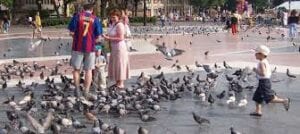
“The five died due to asphyxiation, possibly caused by the presence of gases trapped in the abandoned well. Forensic investigators have been called to the spot to tell us what exactly caused the deaths inside the well,” said AK Sharma, deputy inspector general of police, Ahmedabad division.
The tragedy unfolded with a farmer Pratapsinh Chauhan, 48, spotting a baby pigeon, which accidentally hopped into the well at his farm. Pratap decided to go down the well to rescue it.
“Pratap wanted to rescue the bird and climbed down the well. Some aged farmers working at the neighbouring farm saw him and went down the well to rescue Pratap when he did not emerge,” said an official of Umreth police station.
Pratap was followed down the well by Sana Parmar, 65 and Khiman Parmar, 70. When the farmers failed to return, their family members — Natwar Parmar, 33, Gita Parmar, 32 and Shankar Parmar, 25 — climbed down the dry well to rescue their kin.
Except for Pratap, on one returned alive. When the six persons failed to turn up, the villagers panicked and called for help. All the six were taken out of the well with help of police and Umreth fire brigade personnel.
The victims were rushed to a hospital in Nadiad where the Parmars were declared ‘brought dead’.
Mysteriously though the rescue workers who got the victims out of the dry well said, “We could not locate any pigeon down there.”
Umreth police officials who are investigating the case said, “Only Pratap can tell us why he went down the well. He is unconscious and under treatment.”
Source
Pigeon Patrol Products & Services is the leading manufacturer and distributor of bird deterrent (control) products in Canada. Pigeon Patrol products have solved pest bird problems in industrial, commercial, and residential settings since 2000, by using safe and humane bird deterrents with only bird and animal friendly solutions. At Pigeon Patrol, we manufacture and offer a variety of bird deterrents, ranging from Ultra-flex Bird Spikes with UV protection, Bird Netting, 4-S Bird Gel and the best Ultrasonic and audible sound devices on the market today.
Voted Best Canadian wholesaler for Bird Deterrent products ten years in a row.
Contact us at 1- 877– 4– NO-BIRD, (604) 585-9279 or visit our website at www.pigeonpatrol.ca
Pigeon/Pigeon Patrol / Pigeons Roosting / Vancouver Pigeon Control /Bird Spikes / Bird Control / Bird Deterrent / Pigeon Deterrent? Surrey Pigeon Control / Pest /Seagull deterrent / Vancouver Pigeon Blog / Birds Inside Home / Pigeons in the cities / Ice Pigeons/ What to do about pigeons/ sparrows , Damage by Sparrows, How To Keep Raccoons Away, Why Are Raccoons Considered Pests/ De-fence / Pigeon Nesting/ Bird Droppings / Pigeon Dropping/ woodpecker control/ Professional Bird Control Company/ Keep The Birds Away/ Birds/rats/ seagull/pigeon/woodpecker/ dove/sparrow/pidgeon control/pidgeon problem/ pidgeon control/flying rats/ pigeon Problems/ bird netting/bird gel/bird spray/bird nails/ bird guard

by Pigeon Patrol | Jun 28, 2021 | Bird Netting, history of pigeons, MBCA, pet bird, Pigeon Droppings, Pigeon Patrol's Services
Pigeons (or rock doves), ubiquitous urban birds, are the descendants of birds brought from Europe centuries ago who escaped from captivity and reverted back to the wild. Many city residents and visitors find pigeons pleasant and interesting.
Pigeon Facts
Pigeons mate for life, and both parents care for their young. They flock in large numbers in order to protect themselves from predators. Pigeons naturally stabilize their own populations in accordance with the food supply and other factors. They can fly up to 50 miles per hour and can travel up to 500 miles in one day.1 Their hearing and vision are both excellent.
Pigeons’ navigational abilities, which are largely dependent on keen vision and a superlative memory for topographic details, are legendary. A 10-year study of pigeon flight patterns conducted at Oxford University found that the birds rely more on their knowledge of human transport routes than on their internal magnetic compasses; one scientist said, “We followed some which flew up the Oxford bypass and even turned off at particular junctions. It’s very human-like.”2 One behavioral psychologist who studies pigeons remarked, “Pigeons commit new images to memory at lightning speed. . . . They organize images of things into the same logical categories that human beings use when we conceptualize.”3
The Disease Myth
The most widespread misconception about urban pigeons is that they are carriers of disease. Pest-control companies charge them with transmitting any number of diseases, but the truth is that the vast majority of people are at little to no health risk from pigeons. A search of epidemiological studies over more than 60 years found so few cases of diseases transmitted from feral pigeons to humans that the researchers concluded, “Although feral pigeons pose sporadic health risks to humans, the risk is very low, even for humans involved in occupations that bring them into close contact with nesting sites.”4
Histoplasmosis, cryptococcosis, and psittacosis are diseases that can be transmitted to humans from contact with bird feces, but the risk is considered to be small, with people who have compromised immune systems at the greatest risk.5 Psittacosis is usually associated with parrots in captivity.6
Poison Does Not ‘Control’ Pigeons
When people contact pest-control companies for advice on how to resolve conflicts with birds, operators often recommend using avicides, or bird poisons, such as Avitrol and DRC-1339, to “control” bird populations. Companies often tell potential customers that Avitrol and other avicides are “flock-dispersing agents” that “scare” birds away from areas where they are not wanted. They’ll even tell customers that these products are humane, but nothing could be further from the truth. Avicides such as Avitrol are acutely toxic and cause birds and other animals to suffer immensely. Avitrol attacks and impairs birds’ nervous systems. This causes birds who ingest the poison to become disoriented, exhibit erratic flight and tremors, and suffer violent convulsions for hours before they finally succumb to the effects of the toxin. Avitrol has been banned in New York City; San Francisco; Boulder, Colorado; and Portland, Oregon.7
A study published in the journal Veterinary Microbiology cautioned that killing pigeons “by shooting or poisoning is both unethical and ineffective as the place of the killed birds in the population is quickly filled by new juveniles or immigrating birds from neighbouring areas.”8 Any successful method of bird control must concentrate on prevention and making the location inhospitable to birds.
What You Can Do
For starters, don’t feed birds, and eliminate food and litter from the area. Excluding birds from an area and conditioning them to avoid the area are both effective, humane ways of dealing with a pigeon overpopulation problem. Conditioning birds to avoid an area should be done as early as possible in order to effectively discourage the birds from settling in.
Very simple modifications in a building’s structure can discourage birds from landing or nesting on the building. Steel, wood, or stone angled on building ledges prevents pigeons from nesting there. Open areas, such as vents, lofts, or eaves, can be sealed up to prevent pigeons from nesting in them. Bird barriers, including a thin metal coil that resembles a “slinky” toy, can be fastened to a building ledge to discourage birds from landing.
NEVER use sticky, transparent, bird “repellent” caulk. This substance is applied to ledges in the hope that birds will land, feel the stickiness of the caulk, and fly off, never to return. It is extremely dangerous because birds can easily get stuck to the ledges and lose wings or legs as they try to free themselves, or their wings may stick to their bodies, causing them to fall when they try to fly. They can also ingest the substance while cleaning themselves and die of poisoning.
Visual deterrents such as revolving lights, mirrors, or effigies of predator birds can also be effective.
Source
Pigeon Patrol Products & Services is the leading manufacturer and distributor of bird deterrent (control) products in Canada. Pigeon Patrol products have solved pest bird problems in industrial, commercial, and residential settings since 2000, by using safe and humane bird deterrents with only bird and animal friendly solutions. At Pigeon Patrol, we manufacture and offer a variety of bird deterrents, ranging from Ultra-flex Bird Spikes with UV protection, Bird Netting, 4-S Bird Gel and the best Ultrasonic and audible sound devices on the market today.
Voted Best Canadian wholesaler for Bird Deterrent products ten years in a row.
Contact us at 1- 877– 4– NO-BIRD, (604) 585-9279 or visit our website at www.pigeonpatrol.ca
Pigeon/Pigeon Patrol / Pigeons Roosting / Vancouver Pigeon Control /Bird Spikes / Bird Control / Bird Deterrent / Pigeon Deterrent? Surrey Pigeon Control / Pest /Seagull deterrent / Vancouver Pigeon Blog / Birds Inside Home / Pigeons in the cities / Ice Pigeons/ What to do about pigeons/ sparrows , Damage by Sparrows, How To Keep Raccoons Away, Why Are Raccoons Considered Pests/ De-fence / Pigeon Nesting/ Bird Droppings / Pigeon Dropping/ woodpecker control/ Professional Bird Control Company/ Keep The Birds Away/ Birds/rats/ seagull/pigeon/woodpecker/ dove/sparrow/pidgeon control/pidgeon problem/ pidgeon control/flying rats/ pigeon Problems/ bird netting/bird gel/bird spray/bird nails/ bird guard
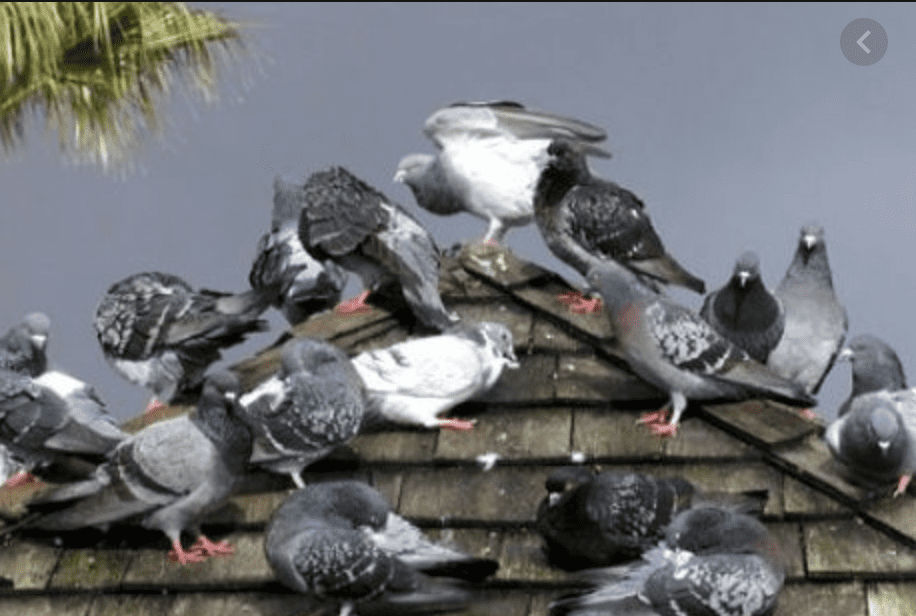
by Pigeon Patrol | Jun 28, 2021 | Pigeon Patrol's Services, Pigeon Predators, Pigeons, Pigeons in the News, Raccoons, Sparrows, UltraSonic Bird Control
Pigeons have been living alongside humans for thousands of years, and have adapted their lifestyle to urban living very successfully. In their natural habitat, they would nest on the sides of tall rocky cliffs. Balconies and ledges on apartment buildings are very similar, so pigeons often choose to nest in these familiar places.
What to do if pigeons are nesting on the balcony
Be patient with a family of pigeons
If the babies have already hatched, really the only thing you can do is wait for them to grow up and fly away. Don’t worry — baby pigeons grow up very quickly! The time between when they hatch from the egg to when they fly away from their nest is usually less than 4 weeks. Once they leave, the babies don’t come back to the nest again.
The parents may try to start another nest in the same spot, even before the first babies have grown up and flown off. Read on to find out how to keep them from nesting on your balcony in the future.
Can’t I just move the nest?
No. Pigeons are very location-specific when it comes to their nest site. Moving the nest over even a few feet — say to a neighbouring balcony — can cause the parents to abandon the nest.
Baby pigeons NEED their parents — they cannot survive without them. Their parents feed them, keep them warm, and even after they’ve left the nest mom and dad show them how to fly, escape from predators, and integrate with the flock.
If you take the babies off of your balcony and move them, even if it’s to a “nice” spot like the local park, they will die. The best thing to do is to let the parents raise this one set of babies. It will take less than a month, they grow up so fast. Once the babies have flown away, you can prevent the pigeons from nesting again in the future.
Keep things tidy
Clean up or put away any things you might be storing on your balcony that are providing shelter or hiding spots for the pigeons to nest. Sweep away any feces or nesting material. It’s fine to do this cleaning while the babies are still on the balcony, just stay away from the exact spot the nest is in.
Remember, the parent pigeons may lay a new set of eggs before the first babies are grown up and gone. You will have to be diligent and go outside every day to sweep away any fresh nesting material. Eventually, the pigeons will get the message that your balcony is not a good place to nest, and they’ll go elsewhere.
What if they lay another set of eggs?
If they do lay a new set of eggs, provided you know that they were laid less than a week ago, it’s fine to dispose of them. We recommend taking them to the local park and hiding them under a bush – that way they can go back to being a part of nature.
If there is a new set of eggs and you’re not sure when they were laid, or you know they’re over two weeks old, we recommend leaving them be and letting the parents raise that brood. Pigeons usually incubate their eggs for about 3 weeks, and then the babies take about 4 weeks to grow up after hatching.
How to keep pigeons from nesting in the future
There are a few different things you can try to make your balcony less attractive to pigeons looking for a place to nest. Remember to wait until AFTER the babies have grown up and flown away before implementing any of these measures. You don’t want to separate the babies from their parents – they will die without their mom and dad.
Keep things tidy
Keeping things tidy and uncluttered is the first step. Pigeons like to choose a sheltered nest spot, so they like furniture and storage items to hide behind. Going out every day and sweeping off any new nesting material is the best thing you can do to prevent pigeon nests. Even just your presence out on the balcony will be enough to discourage many pigeons from nesting. We usually find that nests are made when no one is using the balcony, either early in the season or when the occupants have been out of town for a while.
Keep pigeons from perching
Adult pigeons like to perch on the railing of their nest-site balcony, so they can look around and spot any nearby predators. If you make it impossible to perch on the railing, they’ll usually find somewhere else to go.
We recommend a single length of wire or heavy gauge fishing line. Secure the line tautly about 2-3 inches above and parallel to the balcony railing. Tying it to nails or screws at either end can work. Pigeons aren’t technically perching birds, so it’s hard for them to stand on a piece of wire so thin. They won’t want to build their nest on a balcony where they can’t look out for predators.
Commercial flexible pigeon coils and wires can also work, but will be more expensive to install. We never recommend the use of sticky deterrents, because they can harm both pigeons and other species of birds.
Scare the pigeons away from the balcony
The best thing to scare pigeons away from a balcony is frequent human presence. We usually find that nests are made when no one is using the balcony, either early in the season or when the occupants have been out of town for a while.
You can also use visual deterrents to keep pigeons away from your balcony. Strips of shiny wrapping paper blowing in the breeze, old CDs hanging from string, and colourful spinning pinwheels are some cheap and easy options. Any visual deterrent will be more effective if you move it around or change it up regularly.
And no, those plastic owls don’t really work. At least not for pigeons.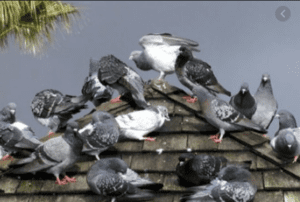
Be careful with pigeon netting
Completely netting in a balcony or ledge can be a very effective way of keeping pigeons from nesting or roosting in that spot. However, pigeon netting MUST be professionally installed and regularly maintained! When pigeon netting gets loose and floppy, it becomes a danger to pigeons, hawks, sparrows, and any other birds that might fly into it and get tangled up.
It is also important to wait until any active nests are finished and all babies have flown away before installing pigeon netting. If the babies are separated from their parents, they will die.
Source
Pigeon Patrol Products & Services is the leading manufacturer and distributor of bird deterrent (control) products in Canada. Pigeon Patrol products have solved pest bird problems in industrial, commercial, and residential settings since 2000, by using safe and humane bird deterrents with only bird and animal friendly solutions. At Pigeon Patrol, we manufacture and offer a variety of bird deterrents, ranging from Ultra-flex Bird Spikes with UV protection, Bird Netting, 4-S Bird Gel and the best Ultrasonic and audible sound devices on the market today.
Voted Best Canadian wholesaler for Bird Deterrent products ten years in a row.
Contact us at 1- 877– 4– NO-BIRD, (604) 585-9279 or visit our website at www.pigeonpatrol.ca
Pigeon/Pigeon Patrol / Pigeons Roosting / Vancouver Pigeon Control /Bird Spikes / Bird Control / Bird Deterrent / Pigeon Deterrent? Surrey Pigeon Control / Pest /Seagull deterrent / Vancouver Pigeon Blog / Birds Inside Home / Pigeons in the cities / Ice Pigeons/ What to do about pigeons/ sparrows , Damage by Sparrows, How To Keep Raccoons Away, Why Are Raccoons Considered Pests/ De-fence / Pigeon Nesting/ Bird Droppings / Pigeon Dropping/ woodpecker control/ Professional Bird Control Company/ Keep The Birds Away/ Birds/rats/ seagull/pigeon/woodpecker/ dove/sparrow/pidgeon control/pidgeon problem/ pidgeon control/flying rats/ pigeon Problems/ bird netting/bird gel/bird spray/bird nails/ bird guard
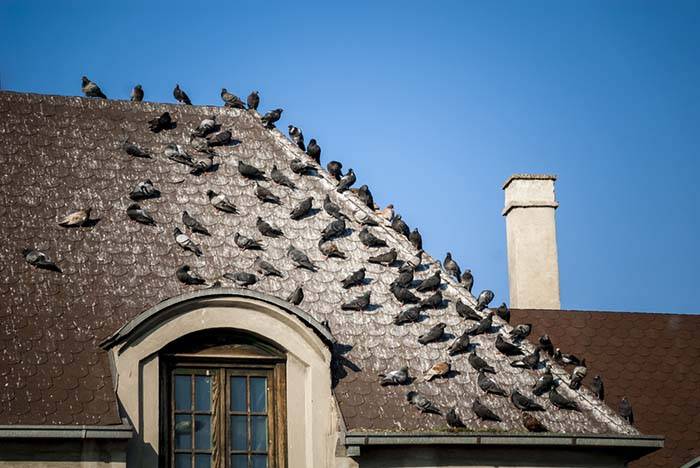
by Pigeon Patrol | Jun 28, 2021 | 4-S Gel Bird repellent, Animal Deterrent Products, Bird Deterrent Products, Bird Law, Bird Netting, Bird Spikes
Pigeons are not pets! Feral pigeon nuisance is becoming a major problem in North America. They are not afraid of people and roost in almost any area where there is a food source. Where they eat, they leave droppings and the feral pigeons in the city and rural areas are associated with a variety of allergens, bacteria, and other health hazards.
Feeding Pigeons Destroys the Ecosystem
Many people enjoy feeding and watching feral birds, but they are unaware that they may be causing more harm than good. Feeding pigeons creates unnaturally large pigeon populations, and overcrowding can cause disease outbreaks in humans and other wild birds. Keeping a food source around your home for feral pigeons should be discouraged. Pigeons are scavengers and providing them with scraps can result in a nutritional deficiency, and they lose their natural ability to travel elsewhere to find food.
Nothing but Pigeon Poop
A typical pigeon dispenses about 25 pounds of fecal matter per year. Pigeon-related damage costs cities and homeowners for pest control and sanitation, but an even more dire reminder why you shouldn’t feed them are the diseases that can be spread from the droppings. Even with the spikes, nets, and barriers, pigeon-proofing has become a major undertaking. Feral pigeons lay eggs six times a year, and breed more rapidly when near a major food source. In some cities, feeding pigeons is illegal. If you have ever had to clean up after pigeons, you would realize if you don’t feed them they will leave and find their own food source!
Breaking the Habit
Pigeon-lovers are being blamed for the continuous list of complaints about pigeon infestation in major cities across Canada. Even tourists love feeding the pigeons, but they are ruining the building facades and monuments and continue to escalate sanitation costs. Power washing the aluminum or brick on your home is also costly. Pigeons are intelligent and will remember if they are fed. They will return and roost and find a place to nest. Eventually, you will be left with the droppings, and if an infestation occurs, it could get costly.
Dealing with an Overpopulation
If you inadvertently have fed the pigeons and you notice that you have a problem, call a pest control agent to assess the severity of the flock. Before they become a health hazard, or breed, or attract more feral pigeons, DO NOT FEED THEM! If you have bird feeders in your yard, be careful not to drop seed on the ground as this will also attract feral pigeons.
Source
Pigeon Patrol Products & Services is the leading manufacturer and distributor of bird deterrent (control) products in Canada. Pigeon Patrol products have solved pest bird problems in industrial, commercial, and residential settings since 2000, by using safe and humane bird deterrents with only bird and animal friendly solutions. At Pigeon Patrol, we manufacture and offer a variety of bird deterrents, ranging from Ultra-flex Bird Spikes with UV protection, Bird Netting, 4-S Bird Gel and the best Ultrasonic and audible sound devices on the market today.
Voted Best Canadian wholesaler for Bird Deterrent products ten years in a row.
Contact us at 1- 877– 4– NO-BIRD, (604) 585-9279 or visit our website at www.pigeonpatrol.ca
Pigeon/Pigeon Patrol / Pigeons Roosting / Vancouver Pigeon Control /Bird Spikes / Bird Control / Bird Deterrent / Pigeon Deterrent? Surrey Pigeon Control / Pest /Seagull deterrent / Vancouver Pigeon Blog / Birds Inside Home / Pigeons in the cities / Ice Pigeons/ What to do about pigeons/ sparrows , Damage by Sparrows, How To Keep Raccoons Away, Why Are Raccoons Considered Pests/ De-fence / Pigeon Nesting/ Bird Droppings / Pigeon Dropping/ woodpecker control/ Professional Bird Control Company/ Keep The Birds Away/ Birds/rats/ seagull/pigeon/woodpecker/ dove/sparrow/pidgeon control/pidgeon problem/ pidgeon control/flying rats/ pigeon Problems/ bird netting/bird gel/bird spray/bird nails/ bird guard

by Pigeon Patrol | Jun 28, 2021 | Pigeon Patrol's Services, Pigeon Predators, Pigeon Spikes, Pigeons, Pigeons in the News
Birds do not have teeth. Without teeth, a bird cannot chew its food down to bits in its mouth like humans do. As detailed in the textbook Ornithology by Frank B. Gill, birds must instead rely on the muscular stomach-like pouch called the gizzard to crush down their food. Many species swallow stones and grit to aid in digestion. These stones remain in the gizzard and crush the food as the gizzard contracts. From a functional perspective, gizzard stones in birds are the equivalent of teeth in humans. When a gizzard stone becomes too smooth to do its job, the bird regurgitates the stone or passes the stone down and out through its digestive tract. Species that do not swallow stones are able to use the sheer muscle power of their gizzards to grind down their food. Birds do not have teeth because the teeth and the jaw bone to support them are too heavy for efficient flight. Many birds have a series of notches in their beak or spikes on the inside of their beak or tongue. These notches and spikes are not true teeth as they are not used to crush down their food. Instead, these features are used to get a good grip on the prey so that it does not escape. In ancient evolutionary history, there were birds with true teeth. Known as odontornithes, these animals are no longer alive today.
Source
Pigeon Patrol Products & Services is the leading manufacturer and distributor of bird deterrent (control) products in Canada. Pigeon Patrol products have solved pest bird problems in industrial, commercial, and residential settings since 2000, by using safe and humane bird deterrents with only bird and animal friendly solutions. At Pigeon Patrol, we manufacture and offer a variety of bird deterrents, ranging from Ultra-flex Bird Spikes with UV protection, Bird Netting, 4-S Bird Gel and the best Ultrasonic and audible sound devices on the market today.
Voted Best Canadian wholesaler for Bird Deterrent products ten years in a row.
Contact us at 1- 877– 4– NO-BIRD, (604) 585-9279 or visit our website at www.pigeonpatrol.ca
Pigeon/Pigeon Patrol / Pigeons Roosting / Vancouver Pigeon Control /Bird Spikes / Bird Control / Bird Deterrent / Pigeon Deterrent? Surrey Pigeon Control / Pest /Seagull deterrent / Vancouver Pigeon Blog / Birds Inside Home / Pigeons in the cities / Ice Pigeons/ What to do about pigeons/ sparrows , Damage by Sparrows, How To Keep Raccoons Away, Why Are Raccoons Considered Pests/ De-fence / Pigeon Nesting/ Bird Droppings / Pigeon Dropping/ woodpecker control/ Professional Bird Control Company/ Keep The Birds Away/ Birds/rats/ seagull/pigeon/woodpecker/ dove/sparrow/pidgeon control/pidgeon problem/ pidgeon control/flying rats/ pigeon Problems/ bird netting/bird gel/bird spray/bird nails/ bird guard











